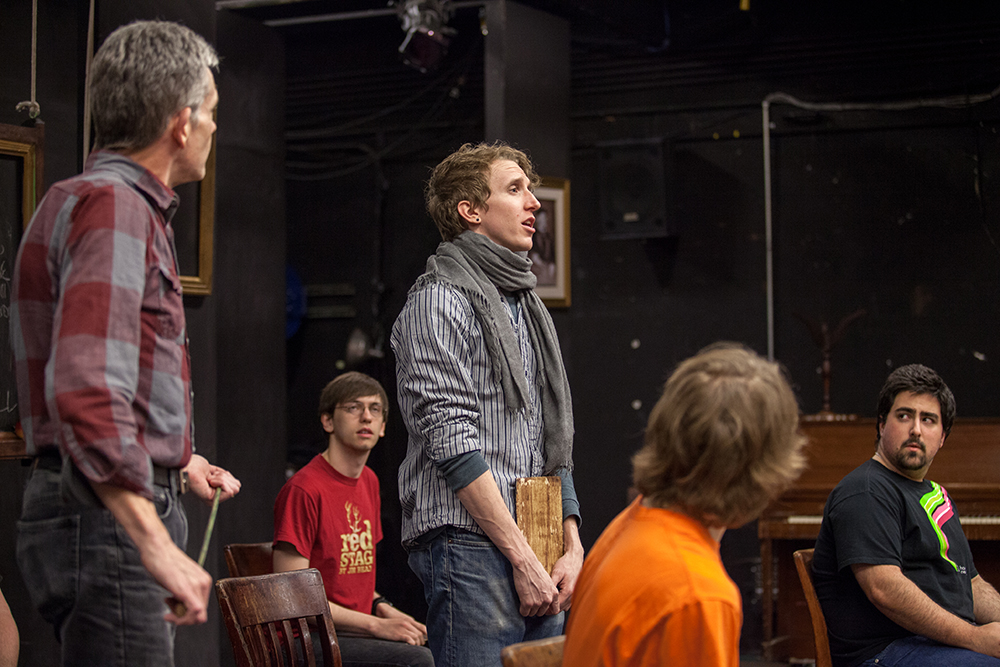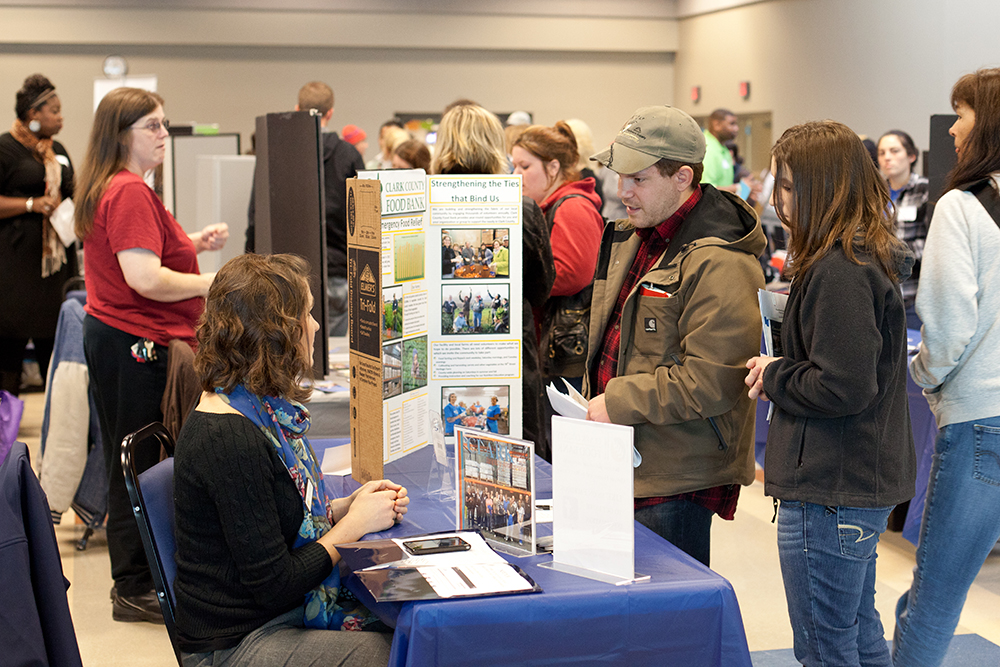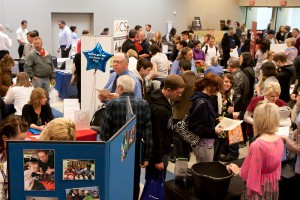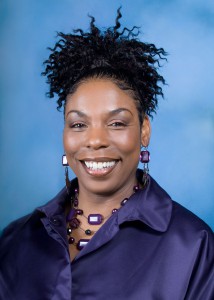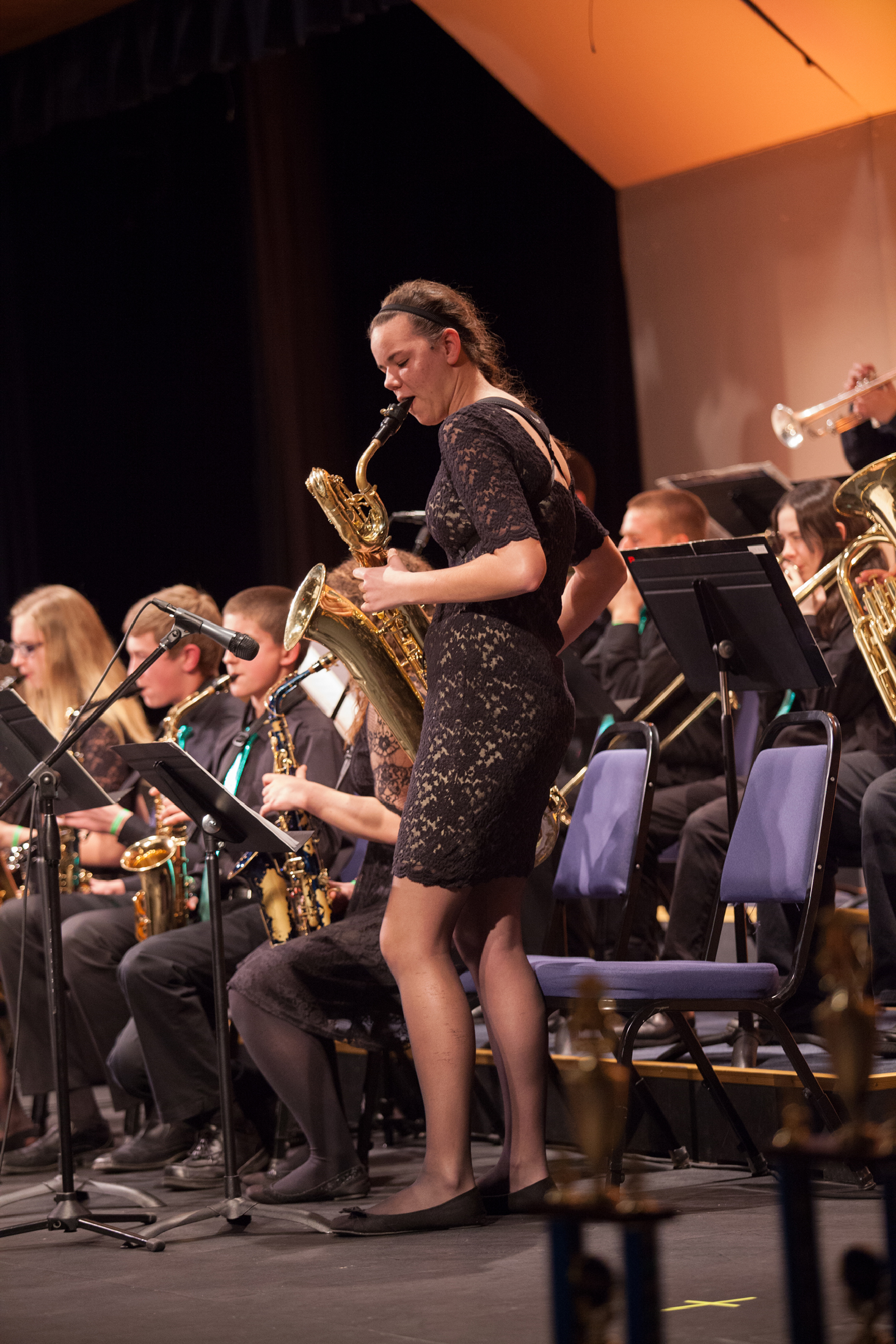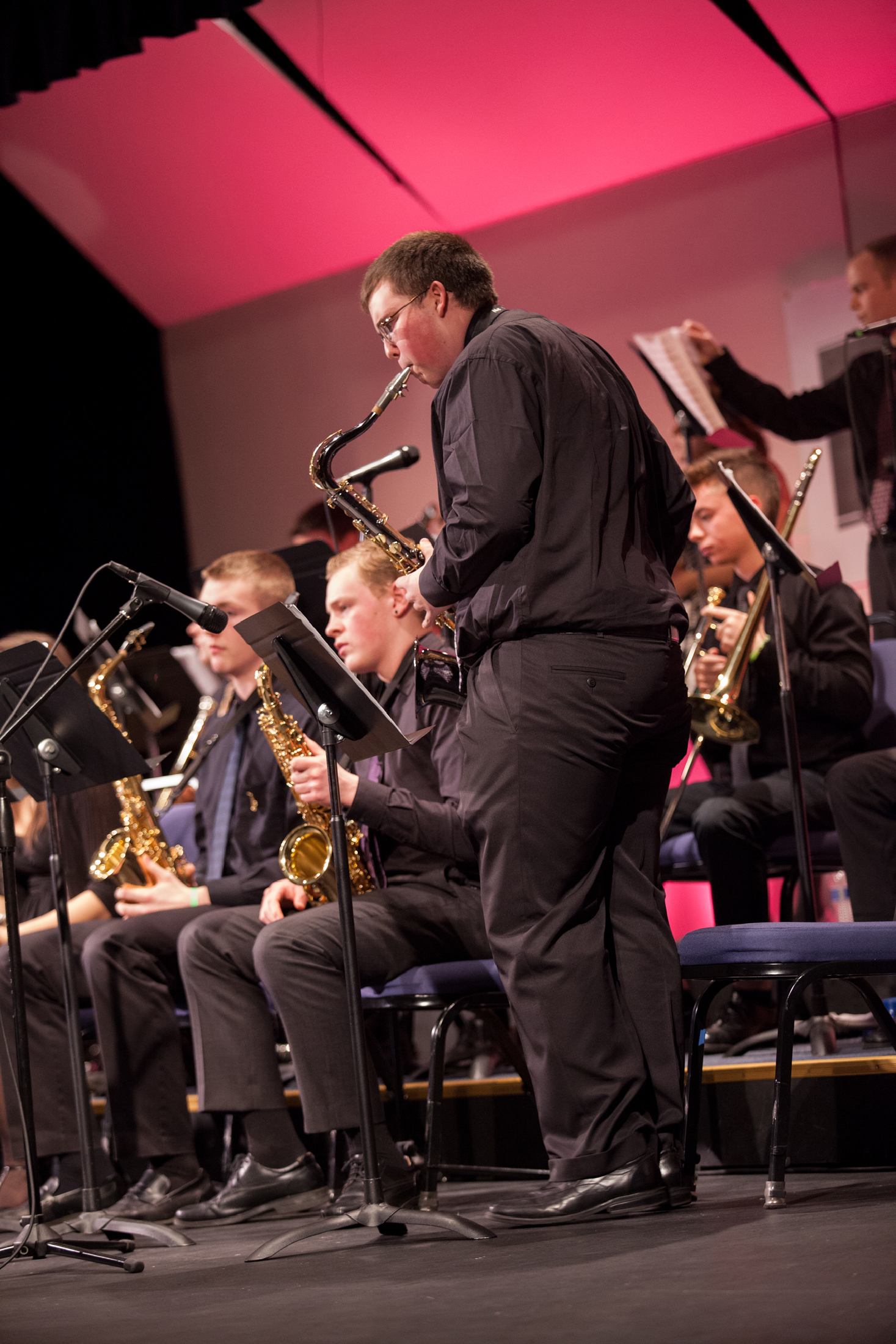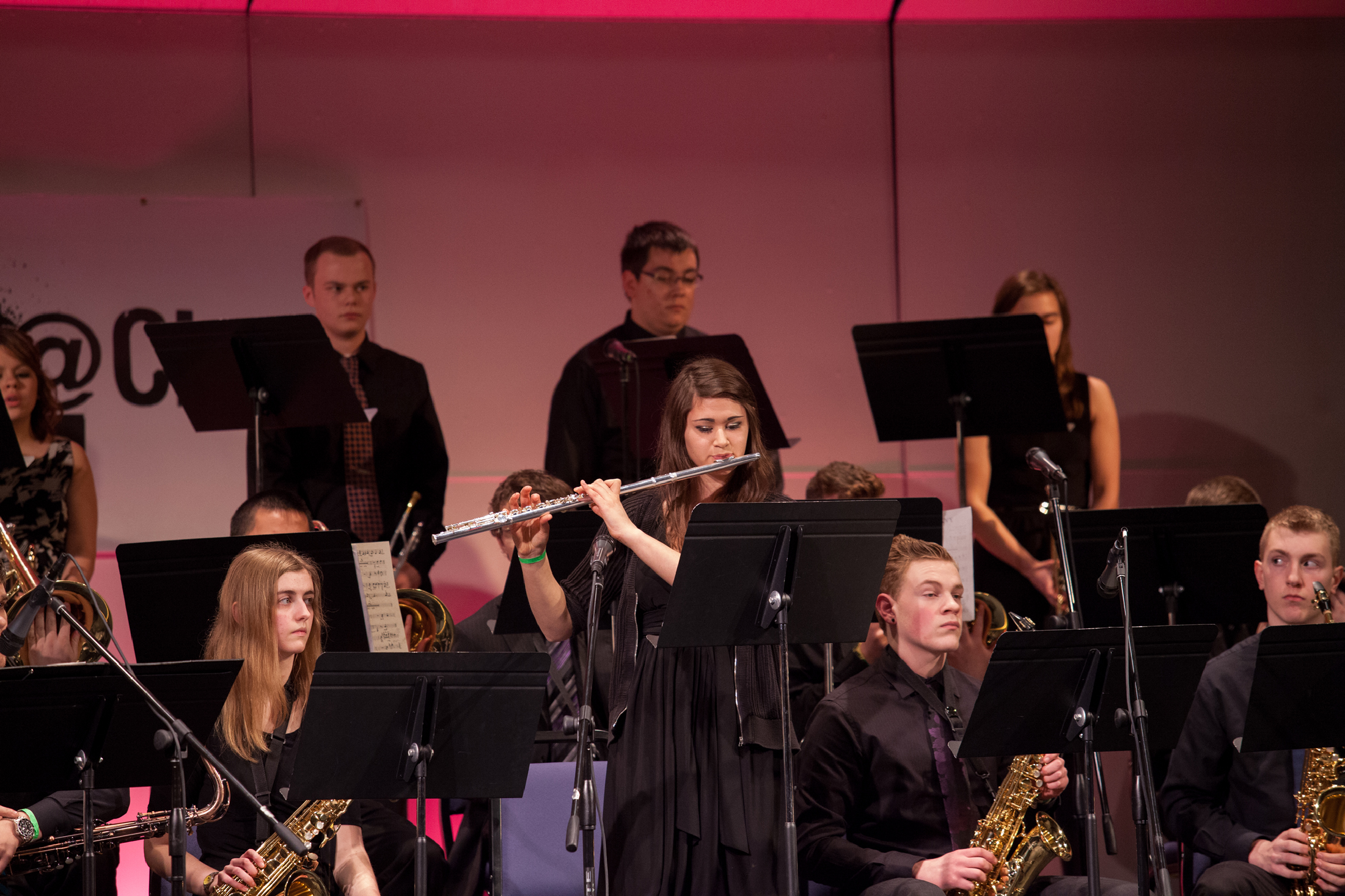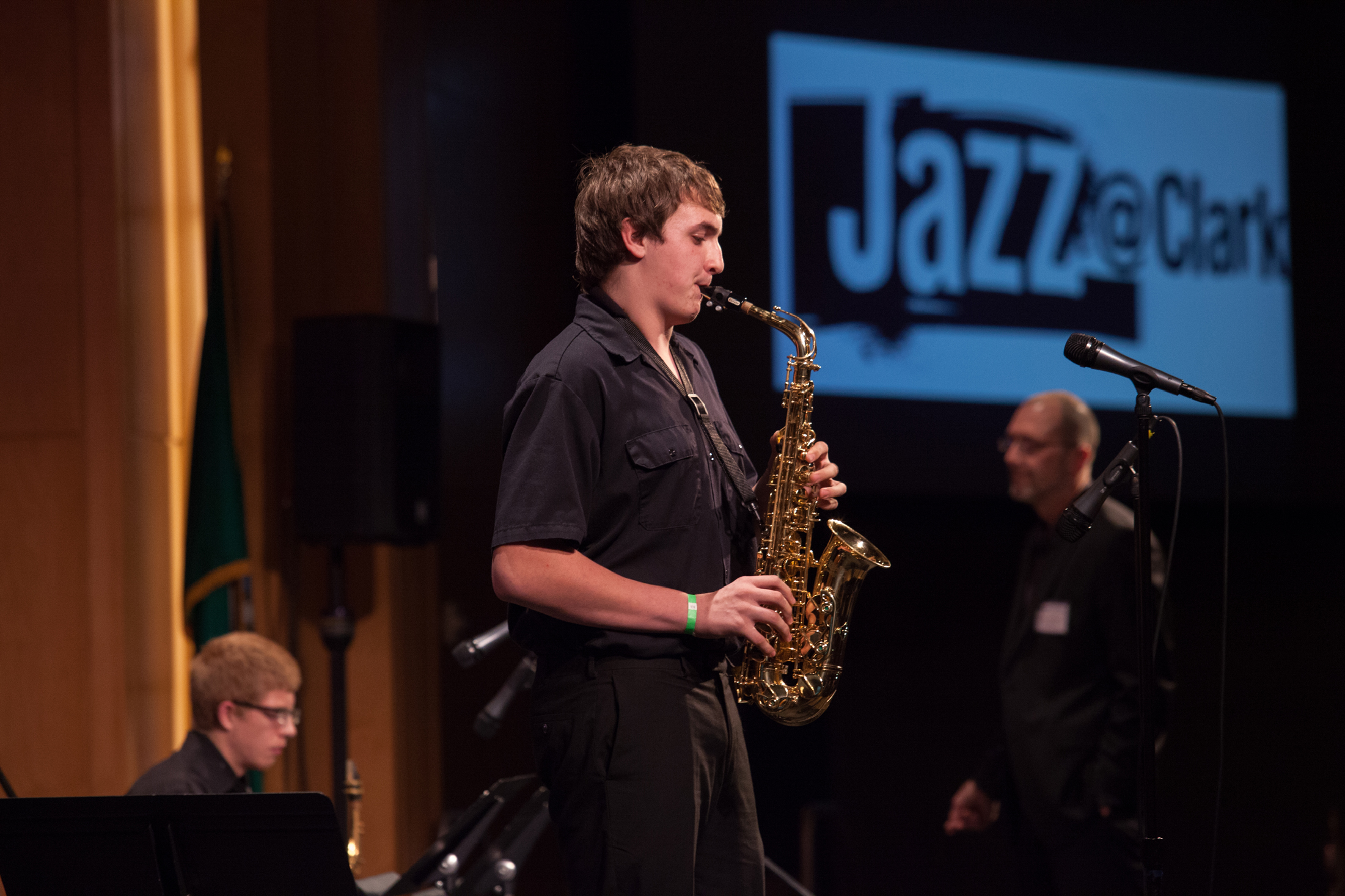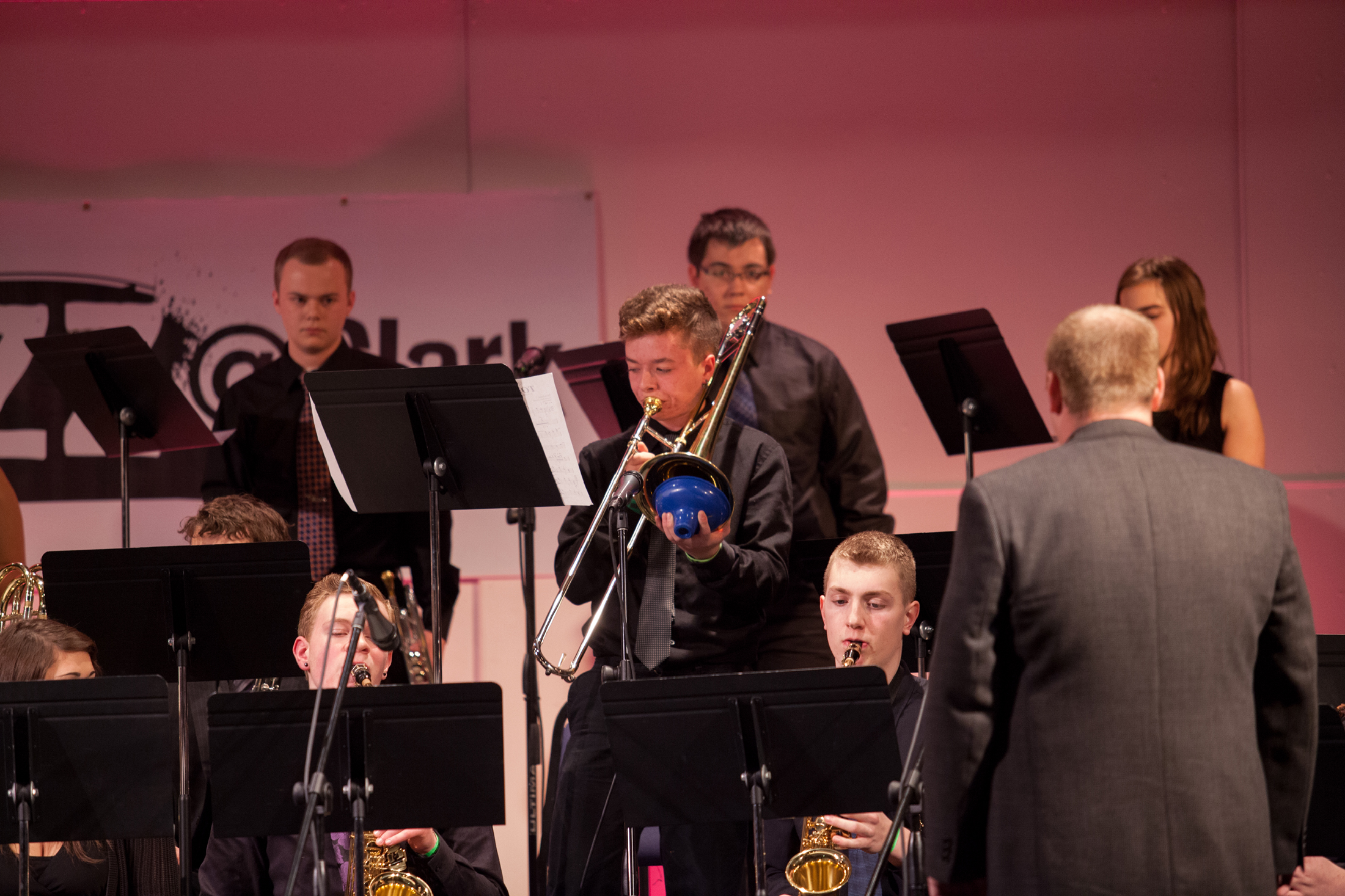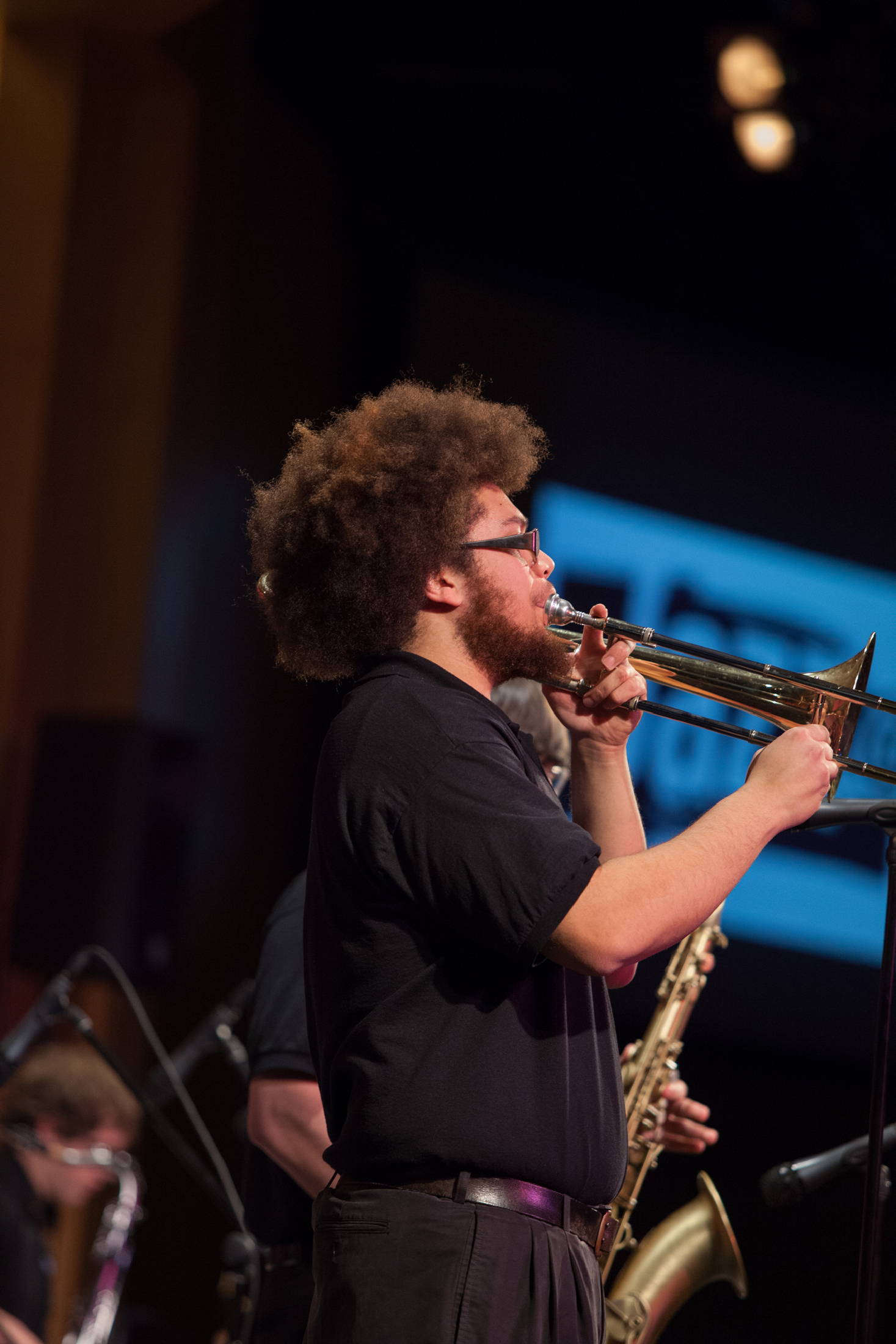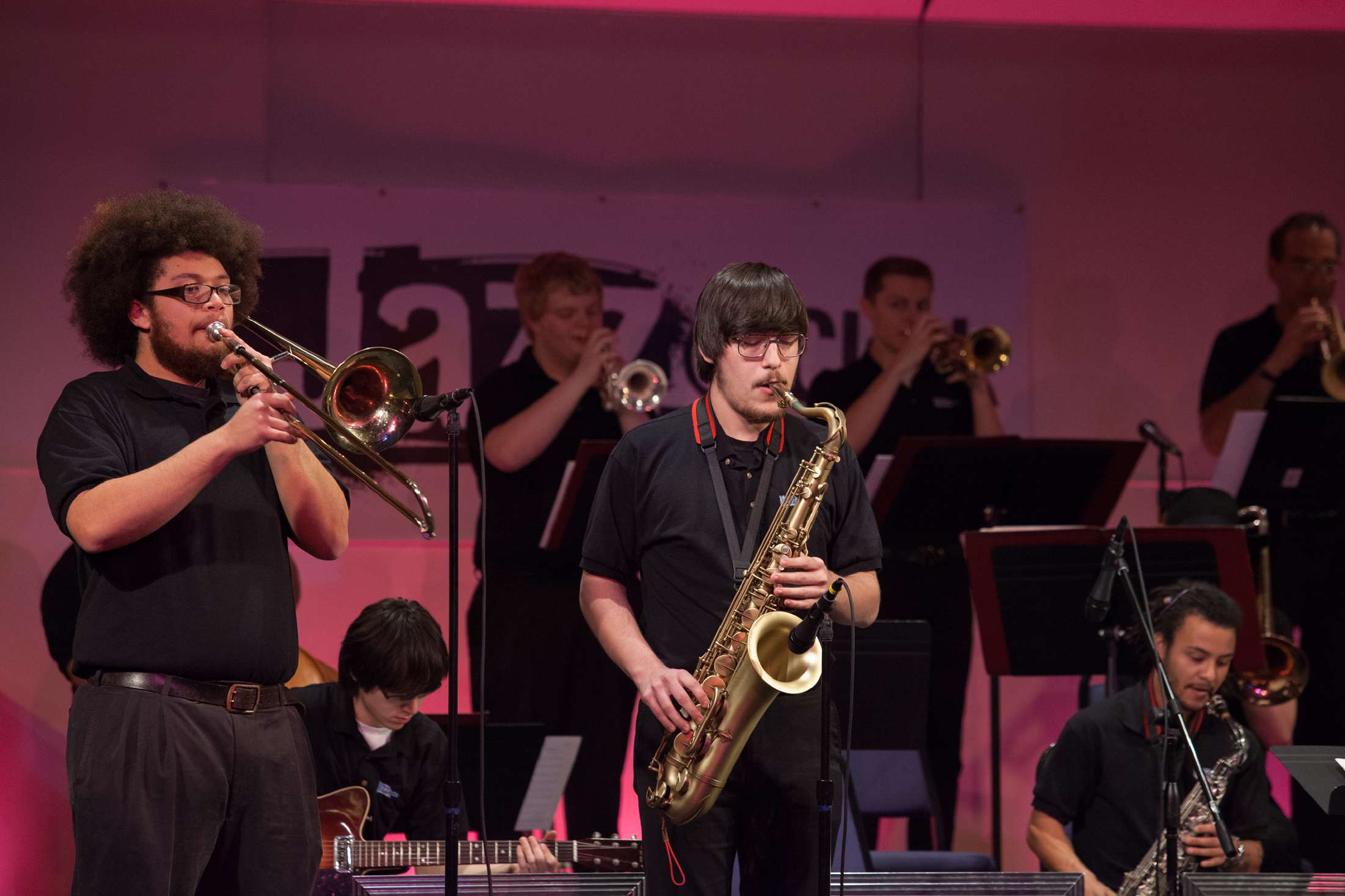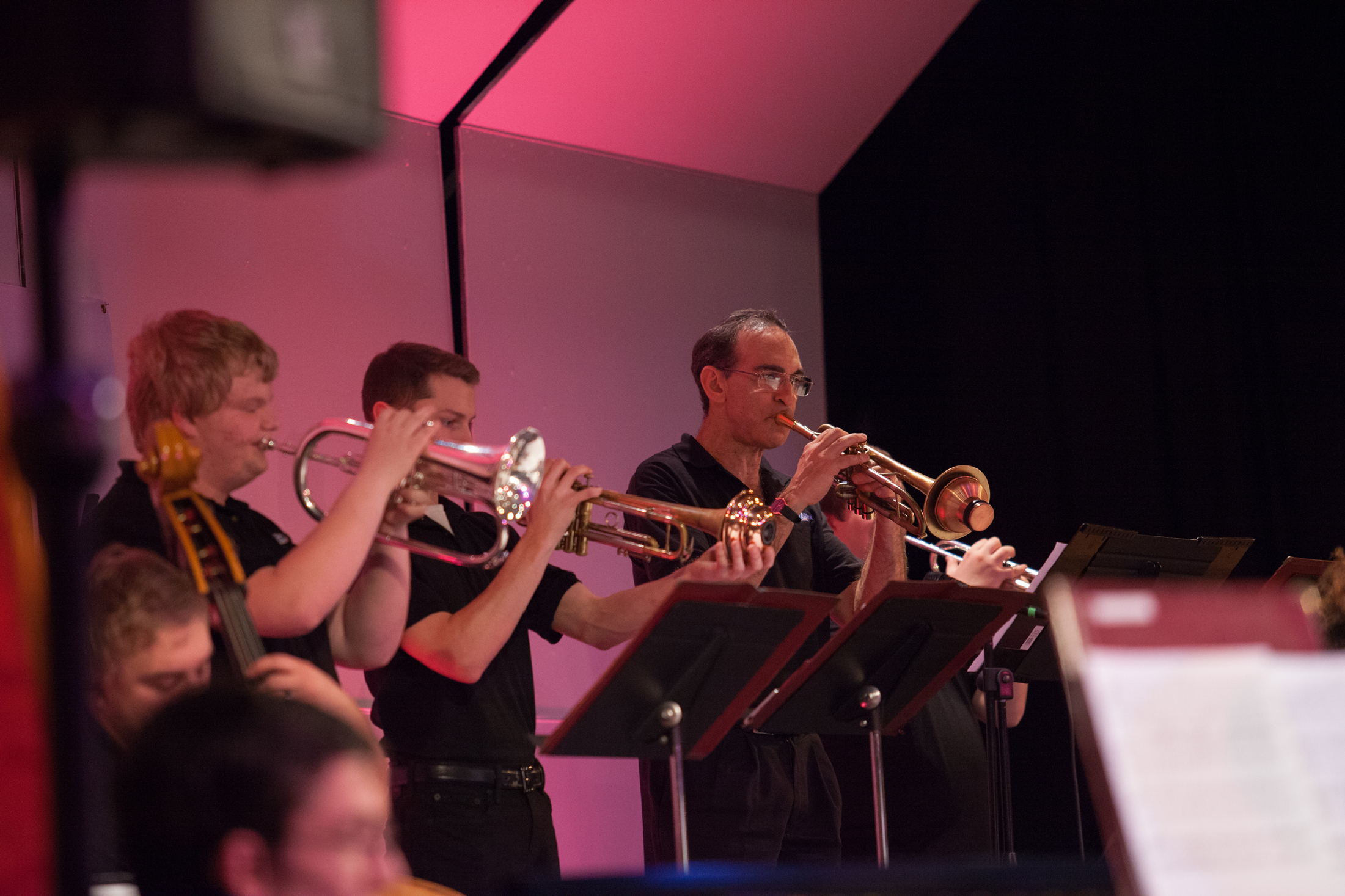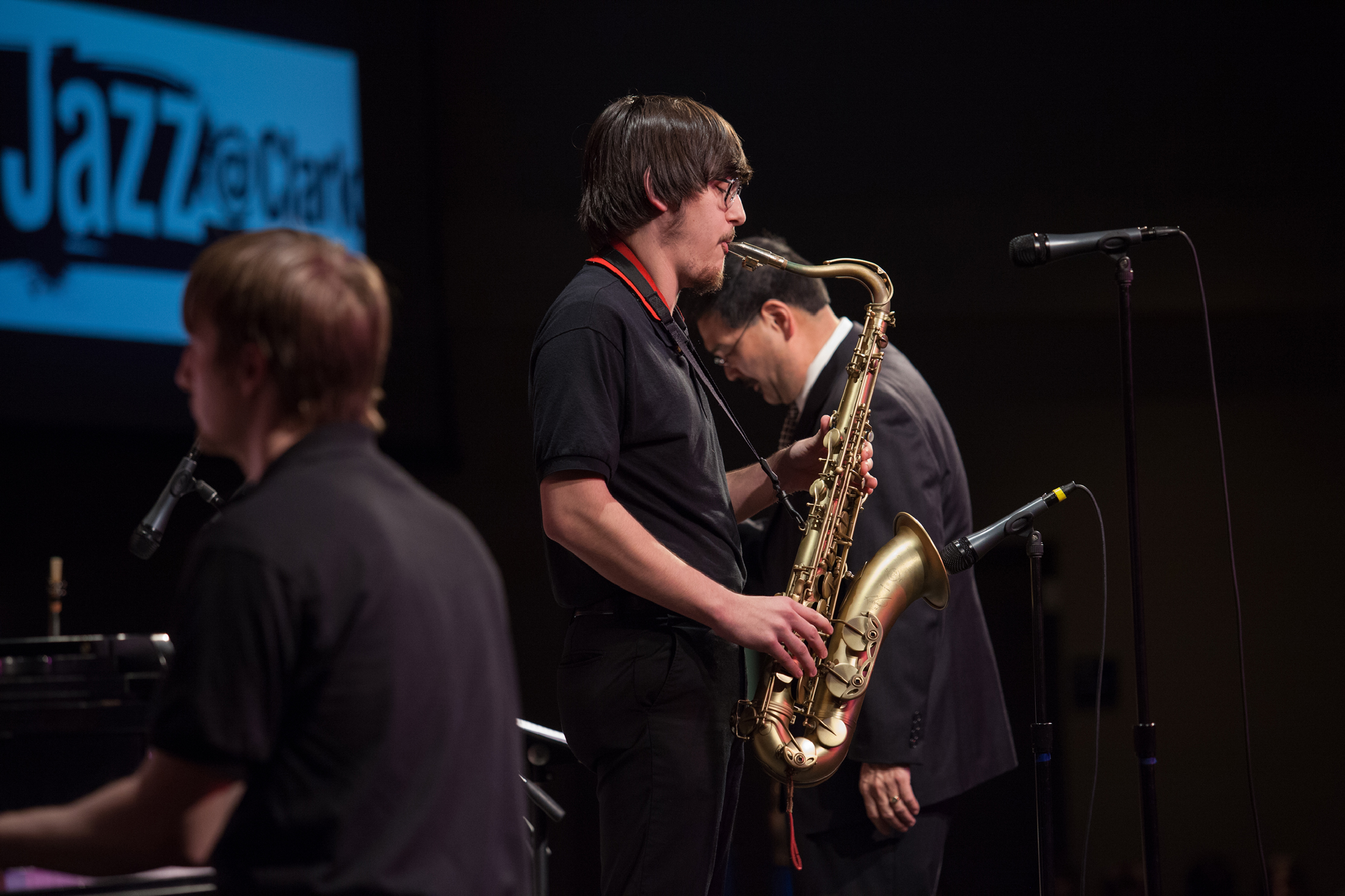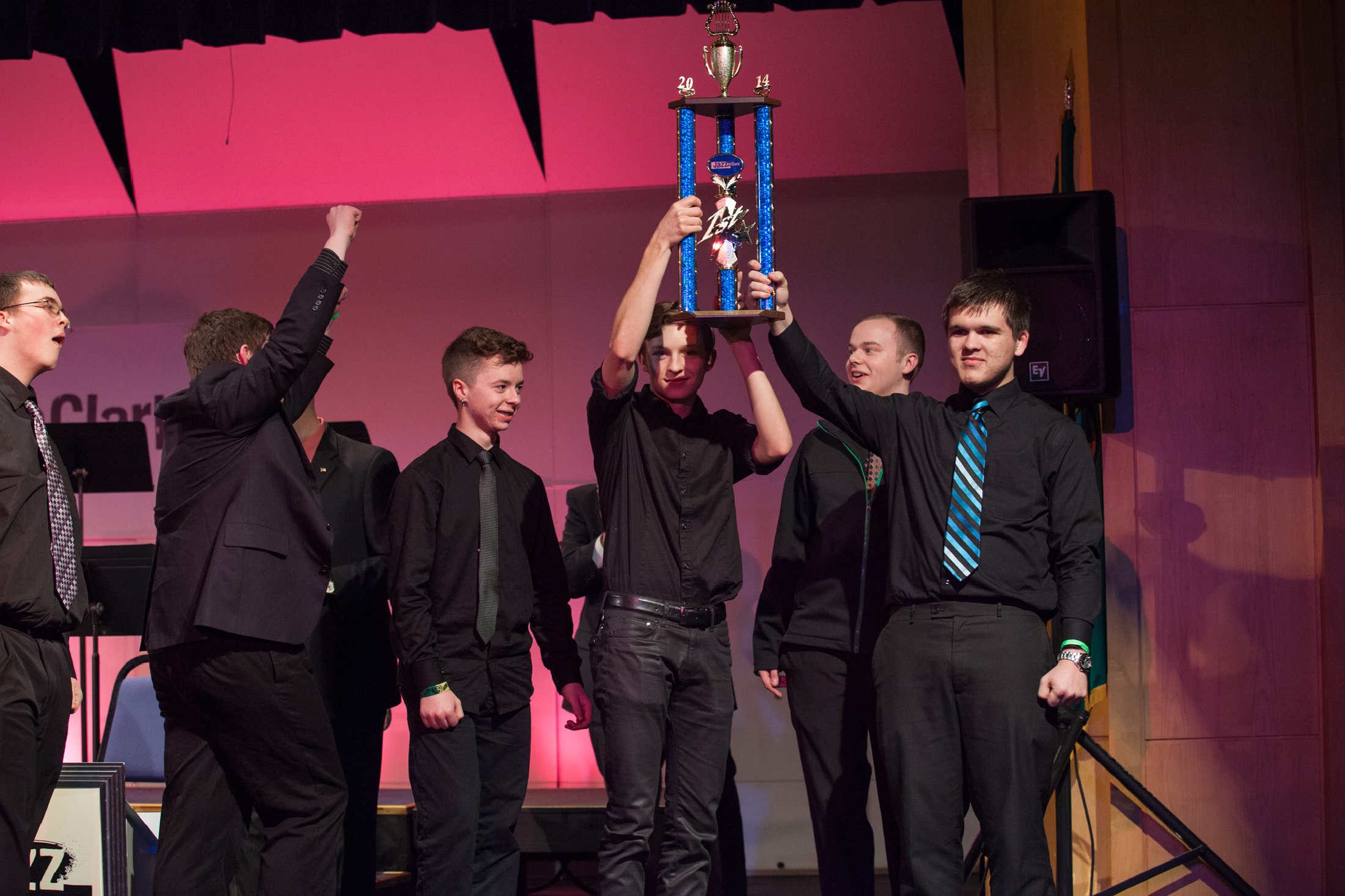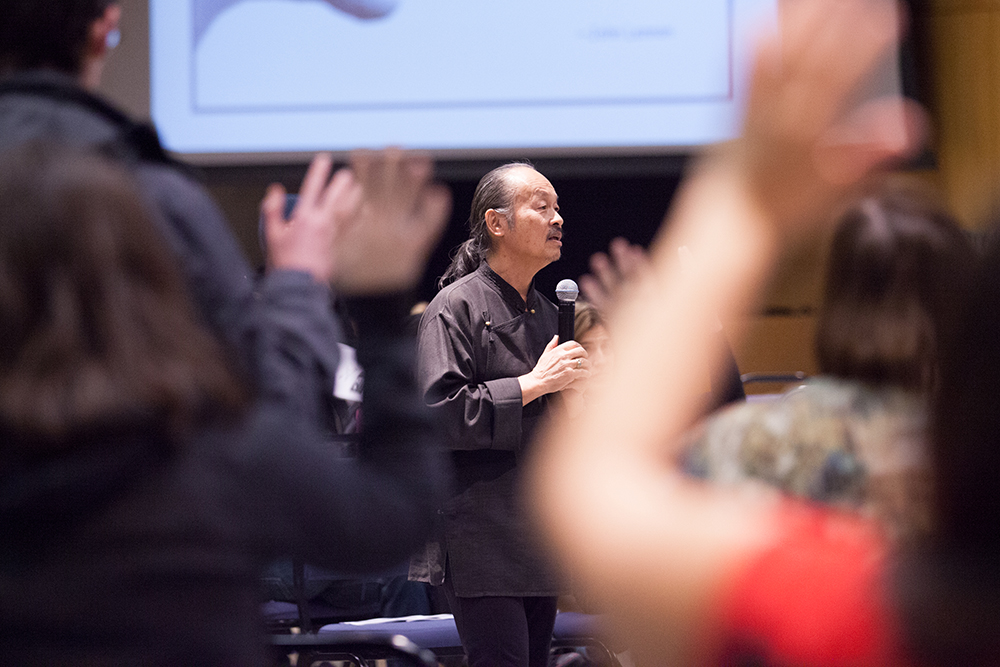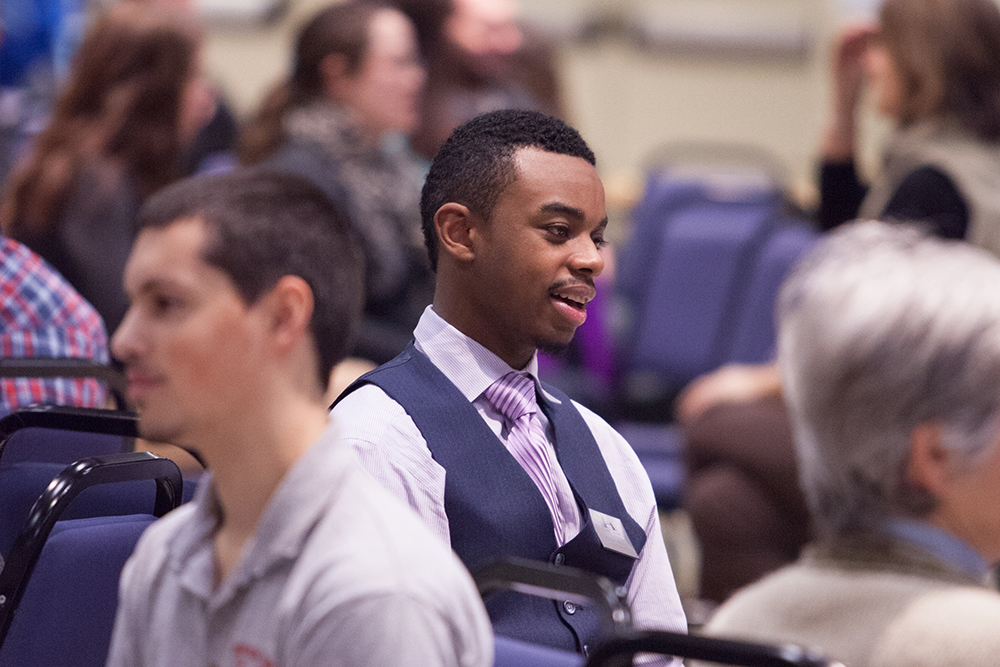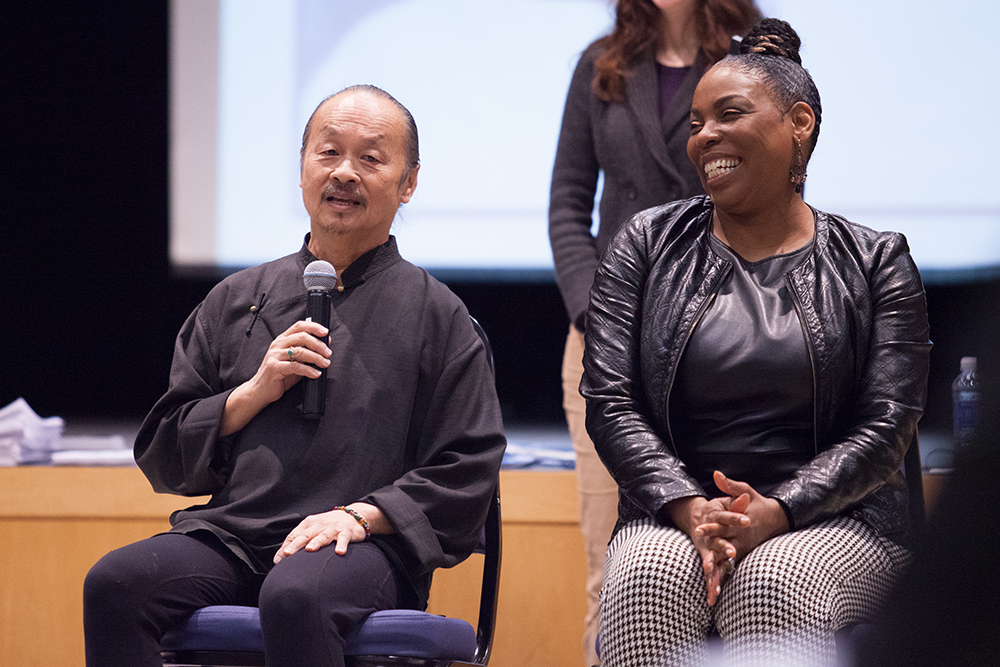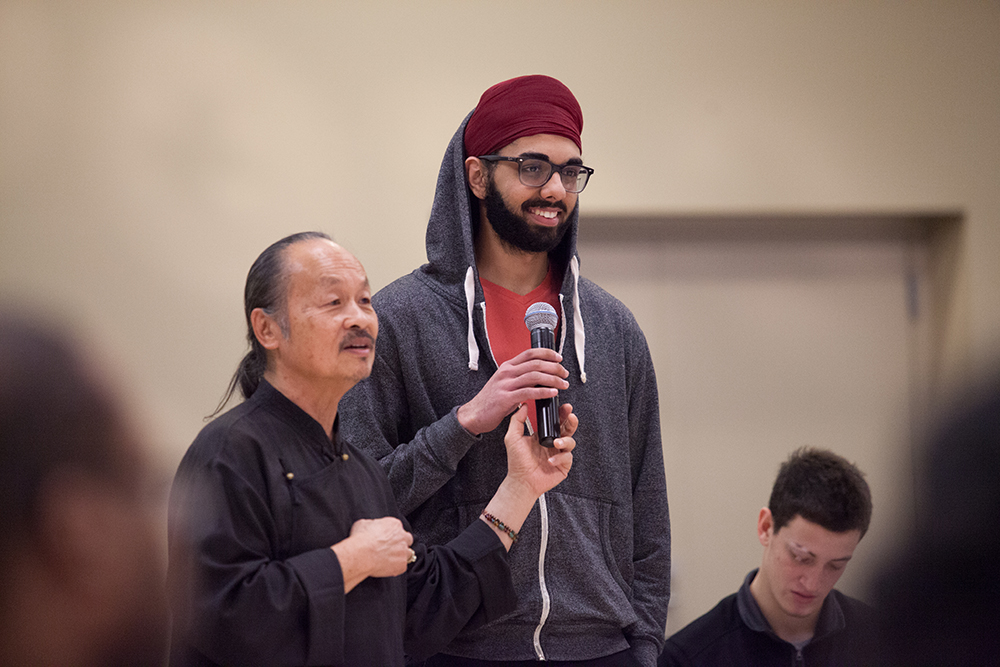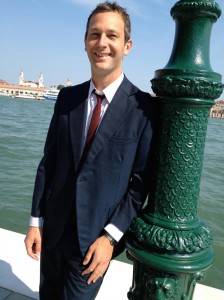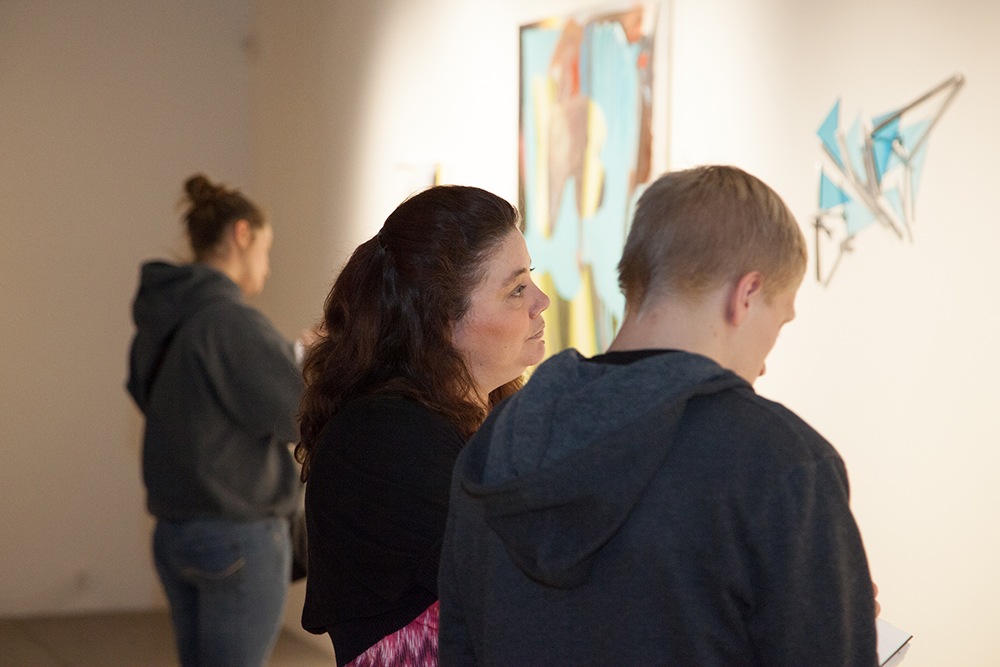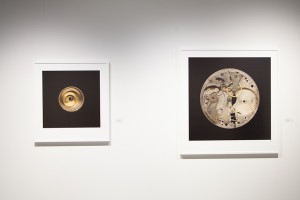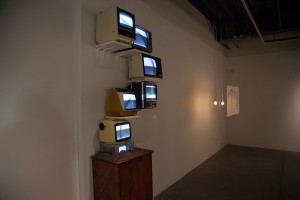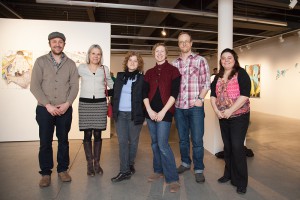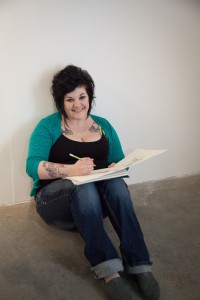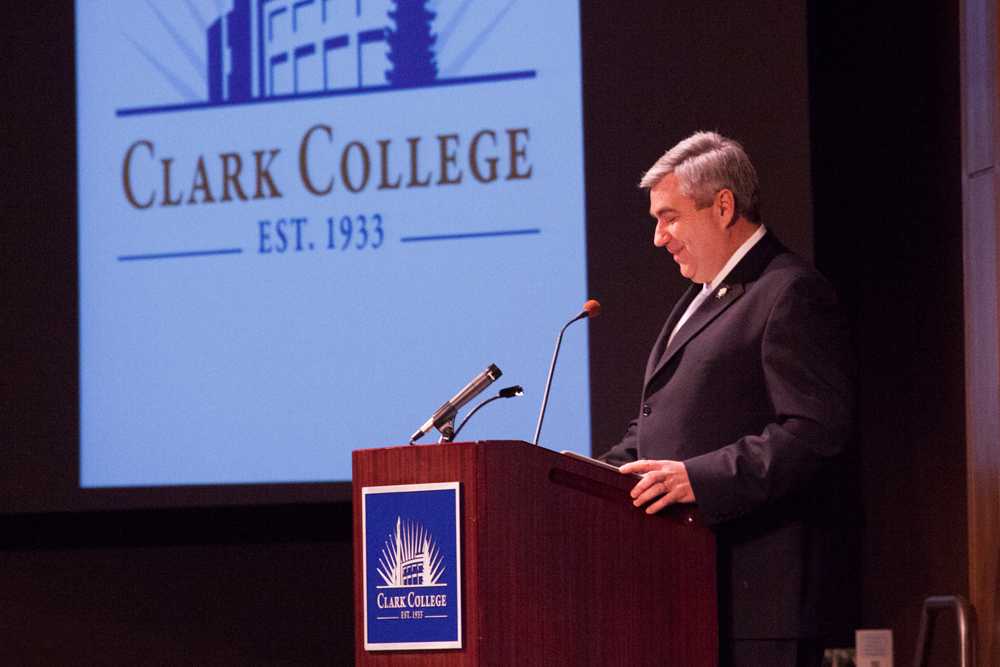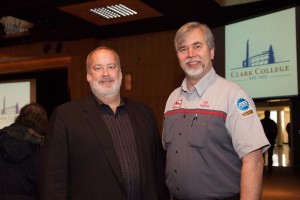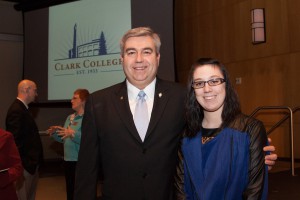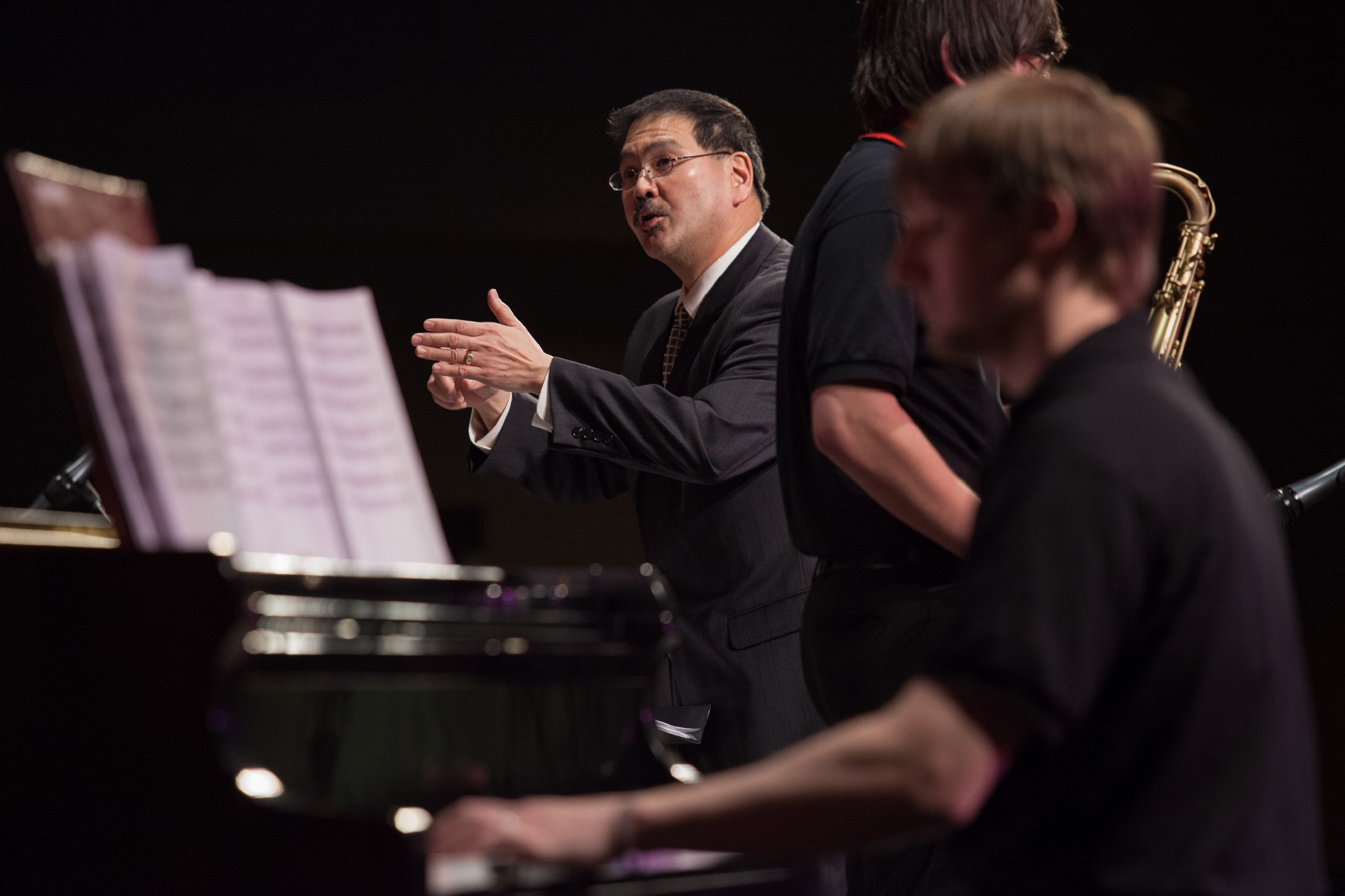
Clark College Band Director Rich Inouye leads the Clark College Jazz Ensemble at the college’s 52nd annual Jazz Festival.
From January 30 through February 1, Gaiser Student Center was swinging with the sounds of big-band jazz during Clark College’s renowned Jazz Festival. The event brought 60 jazz bands from middle and high schools around the region to compete in multiple divisions.
But while the sounds were big, some of the musicians were still quite small: The first day of this annual tradition was devoted entirely to middle school performers. Festival director and Clark College music professor Rich Inouye explained the importance of including these young performers in the competition.
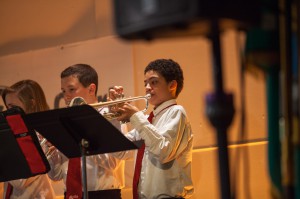
Aspire Middle School participates in the Jazz Festival.
“Encouraging jazz performance at the middle-school level is very important to ensuring young people realize how important jazz music is to our culture,” he said. “The style and characteristics of the music promote independence of thought, self-discipline, responsibility, communication, and teamwork, and the festival environment not only allows them to strive for excellence in their performance, but also allows them to listen to the excellence their peers from the other schools represent.”
On Friday night, before the A and AA awards were announced, Inouye gave the gathered competitors another source of inspiration: Before he led the Clark College Jazz Ensemble through their own performance, he introduced his students by name and said which high school each had attended, illustrating how many had come from A and AA schools. The crowd cheered loudly as the names of their schools were mentioned.
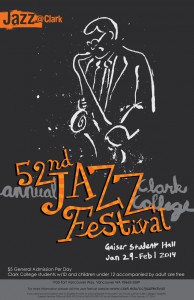
This year’s Jazz Festival poster and program were designed by Clark College student Luke Acevedo, who is nearing the completion of his Associate of Fine Arts degree in Graphic Design at Clark College.
“I have been fortunate to have all the high school directors in the area encourage their students to perform in my bands at Clark,” Inouye said later. “I appreciate all the students who have chosen to come to Clark to play in our bands, but in the last couple years I have had the privilege of getting the top musicians from smaller schools in the outlying areas. The Greater Vancouver-area high schools have some of the strongest band programs in the country … but having been the product of a small, rural school myself, I do have affinity for the smaller, outlying schools. I believe the mix of these students with some of the students from the larger schools is what provides the excitement and distinction for what we do here.”
Now in its 52nd year, the Clark College Jazz Festival is one of Southwest Washington’s largest jazz festivals. Trophies are presented in all divisions, and individual outstanding musician awards are presented at the end of each day’s preliminary competitions. On Saturday evening, the the Dale Beacock Memorial Sweepstakes Award is presented to one outstanding band selected from the entire festival.
For 2014, the Dale Beacock Memorial Sweepstakes trophy was awarded to Garfield High School from Seattle, Washington.
Thursday, January 30, 2014 middle school jazz ensemble finals results:
1st place – Eckstein Middle School from Seattle, Washington
2nd place – Beaumont Middle School from Portland, Oregon
3rd place – Hamilton International Middle School from Seattle, Washington
Special recognition went to Washington Middle School from Seattle, Washington, for being asked to perform in the evening finals.
Outstanding Middle School Jazz Musician certificates were presented to:
Hannah Wells and Joseph Gardner from Aspire Middle School, Lacey, Washington
Milli McFall, Misae Nguyen from Hamilton International Middle School, Seattle, Washington
Brayton Sobolewski and Daniel Conway from Vancouver School of Arts and Academics Middle School, Vancouver, Washington
Eltan Davis and Sammie Wiegand from Beaumont Middle School, Portland, Oregon
Marco Thompson from Washington Middle School, Seattle, Washington
Kai Despain, Sean Bowman, Julia Tanner, Austin Isgrig, and David Maltby from Eckstein Middle School, Seattle, Washington
Katriana Armstrong and Vanessa Gress from Chief Umtuch Middle School, Battle Ground, Washington
Jerich Embleton from Creswell Middle School, Creswell, Oregon
Shermon Mattson from Pleasant Valley Middle School, Vancouver, WA
Shane Walz, Morgan Kennedy, and Ainsle Cromer from Tukes Valley Middle School, Battle Ground, Washington
Skyler Verity from Laurin Middle School, Vancouver, Washington
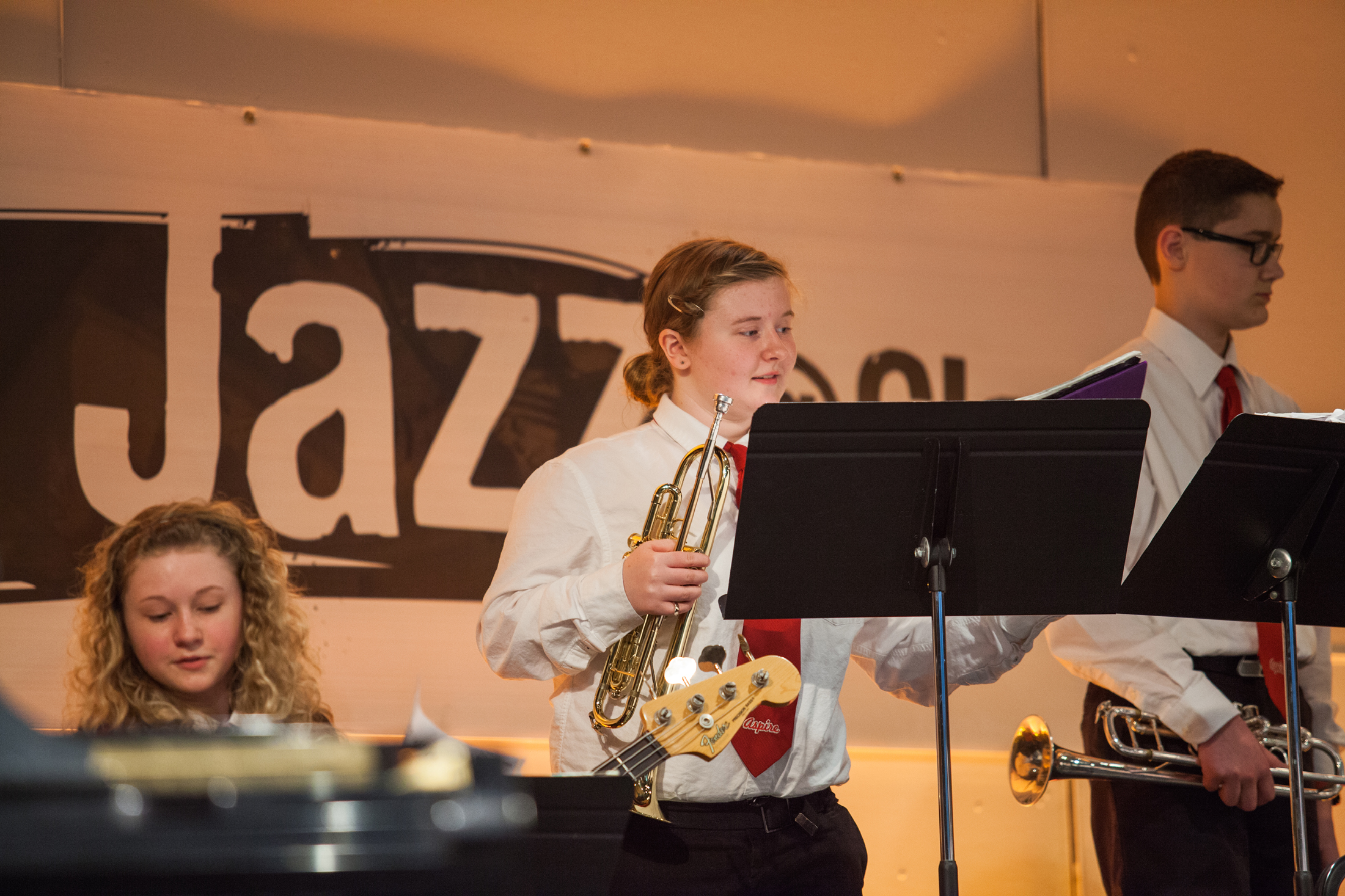
Jazz Festival at Clark College (middle school competition)
Clark College hosts the 52nd annual Jazz Festival. Schools from the region come to compete and participate in music clinics at Clark Colleee.
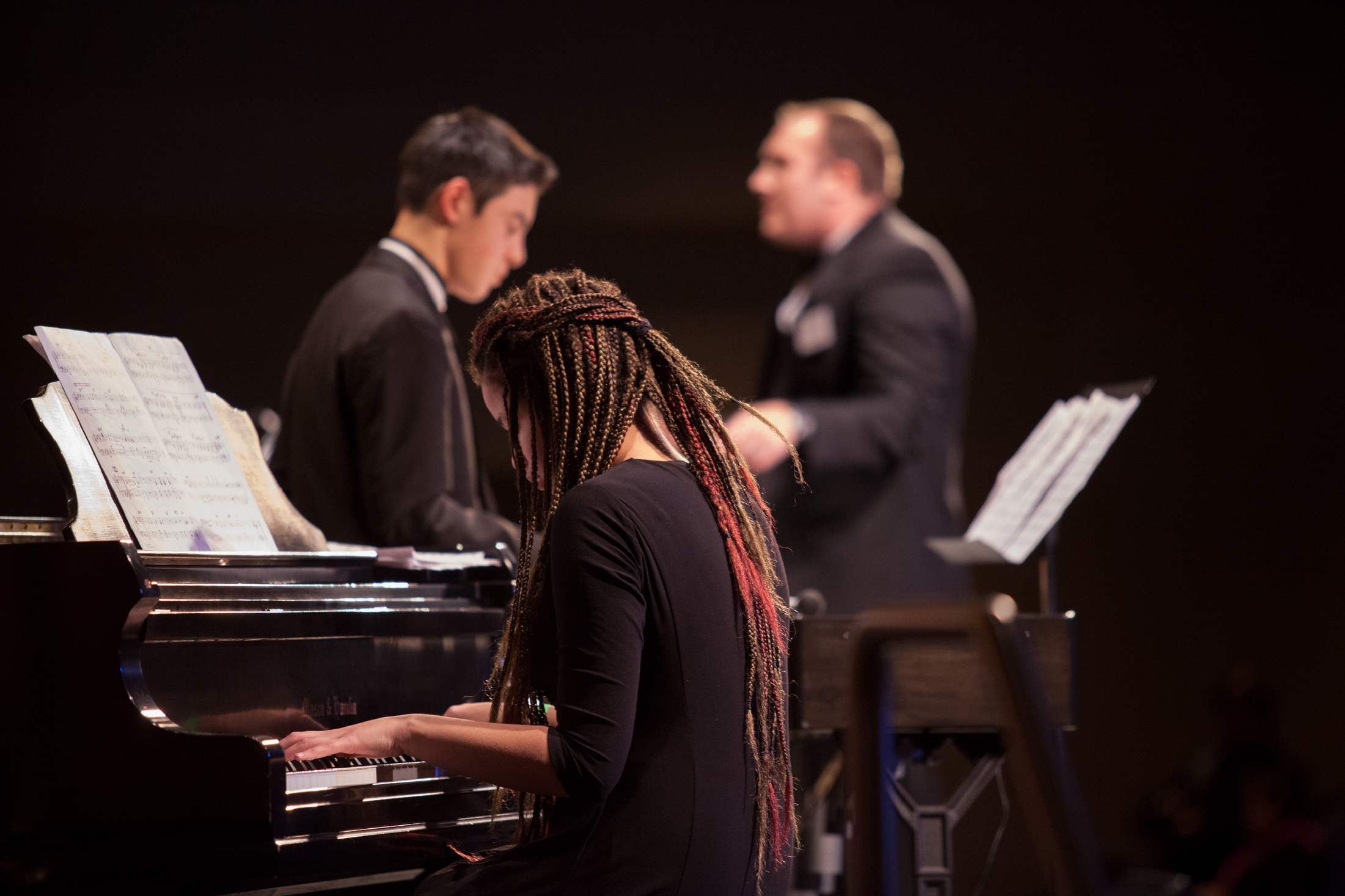
Jazz Festival at Clark College
Clark College hosts the 52nd annual Jazz Festival. Schools from the region come to compete and participate in music clinics at Clark Colleee.
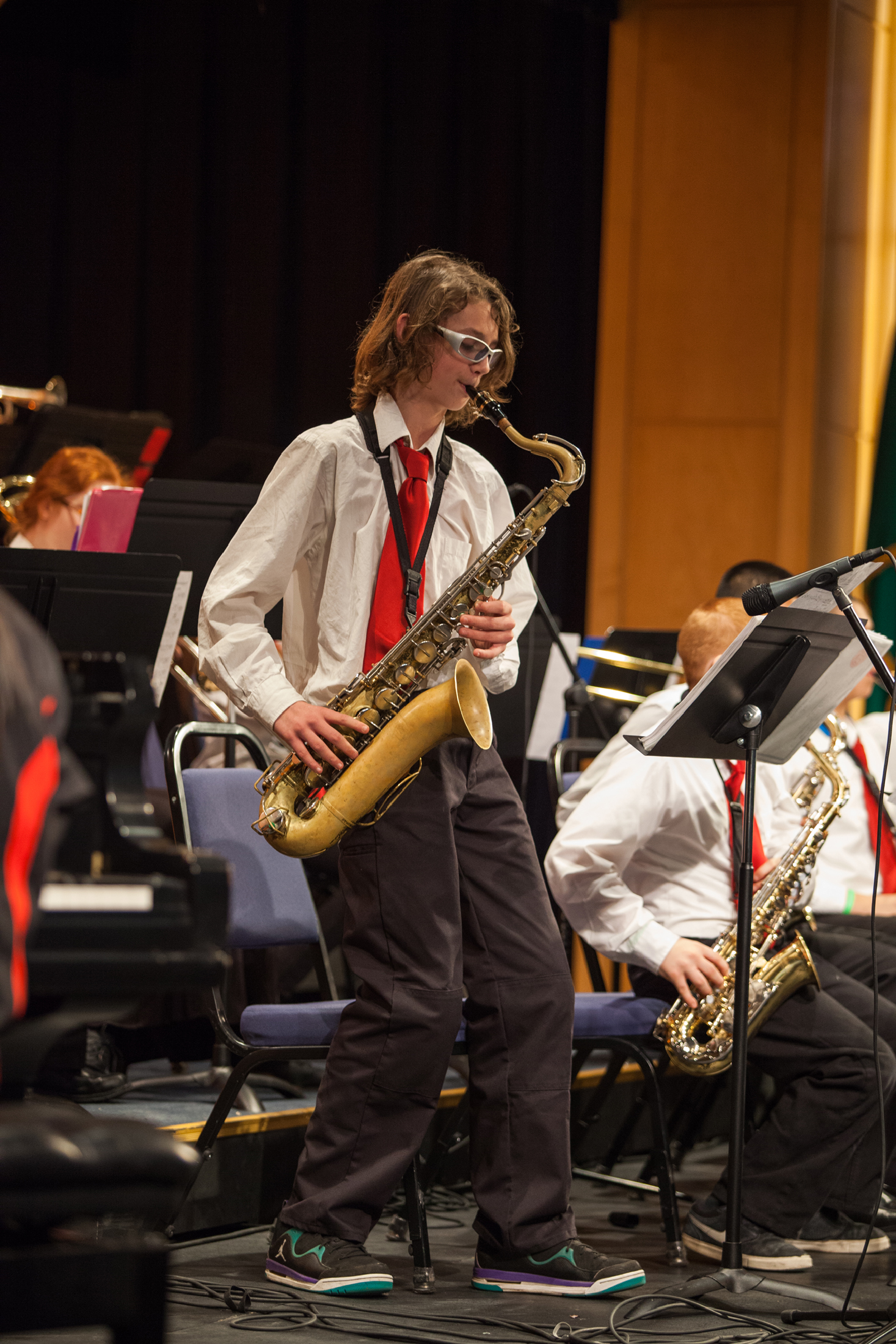
Jazz Festival at Clark College (middle school competition)
Clark College hosts the 52nd annual Jazz Festival. Schools from the region come to compete and participate in music clinics at Clark Colleee.
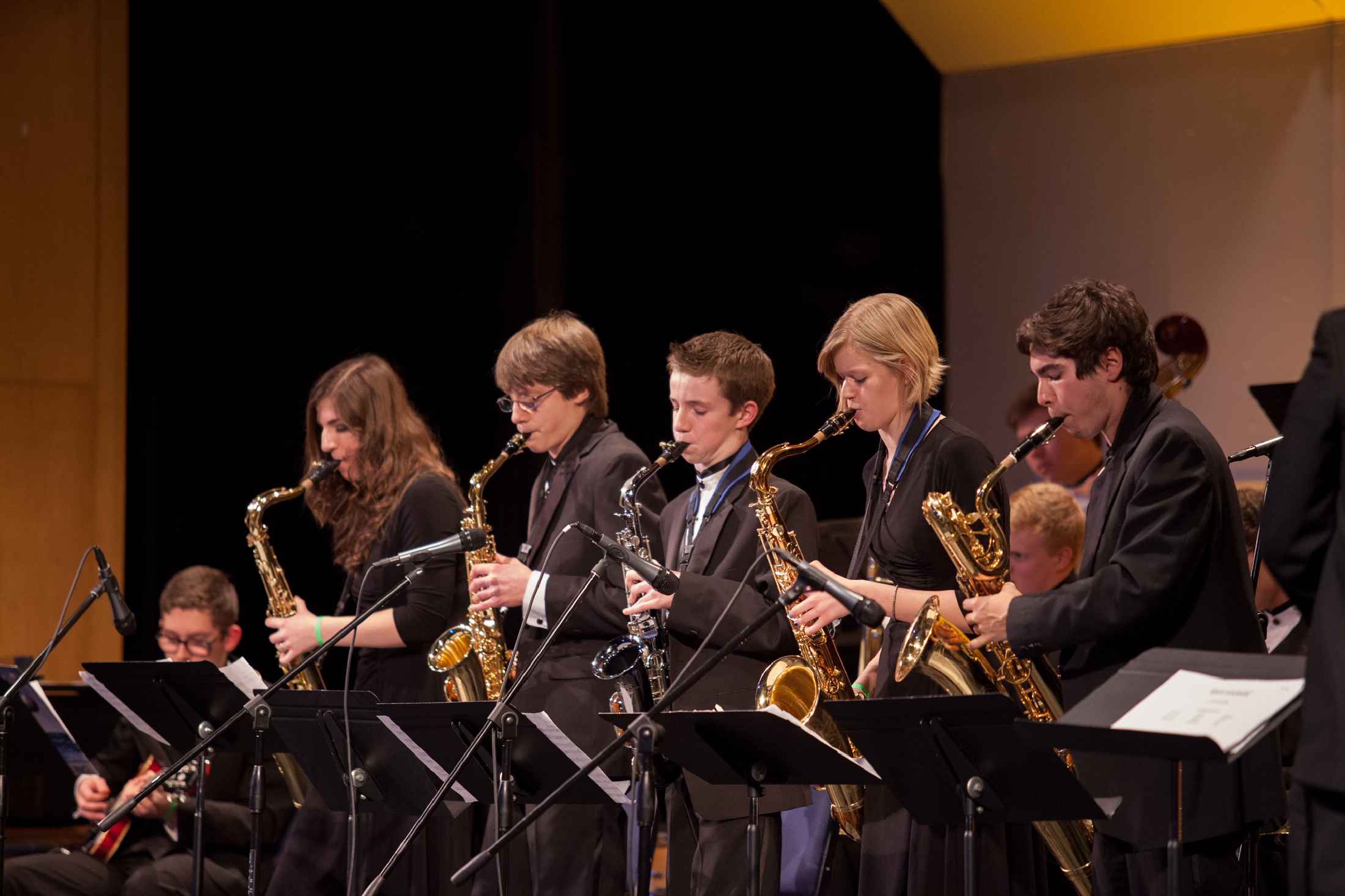
Jazz Festival at Clark College
Clark College hosts the 52nd annual Jazz Festival. Schools from the region come to compete and participate in music clinics at Clark Colleee.
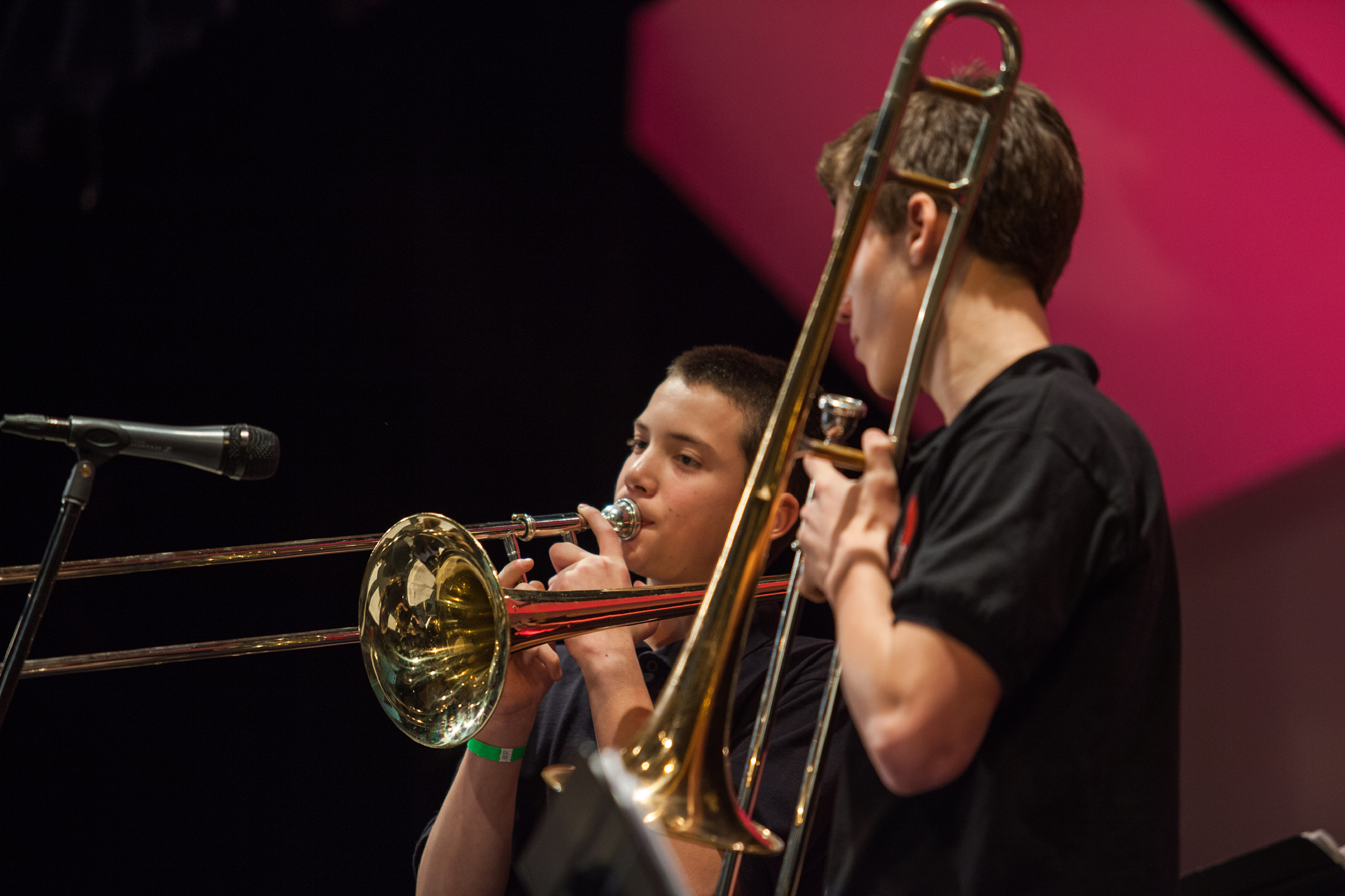
Jazz Festival at Clark College (middle school competition)
Clark College hosts the 52nd annual Jazz Festival. Schools from the region come to compete and participate in music clinics at Clark Colleee.
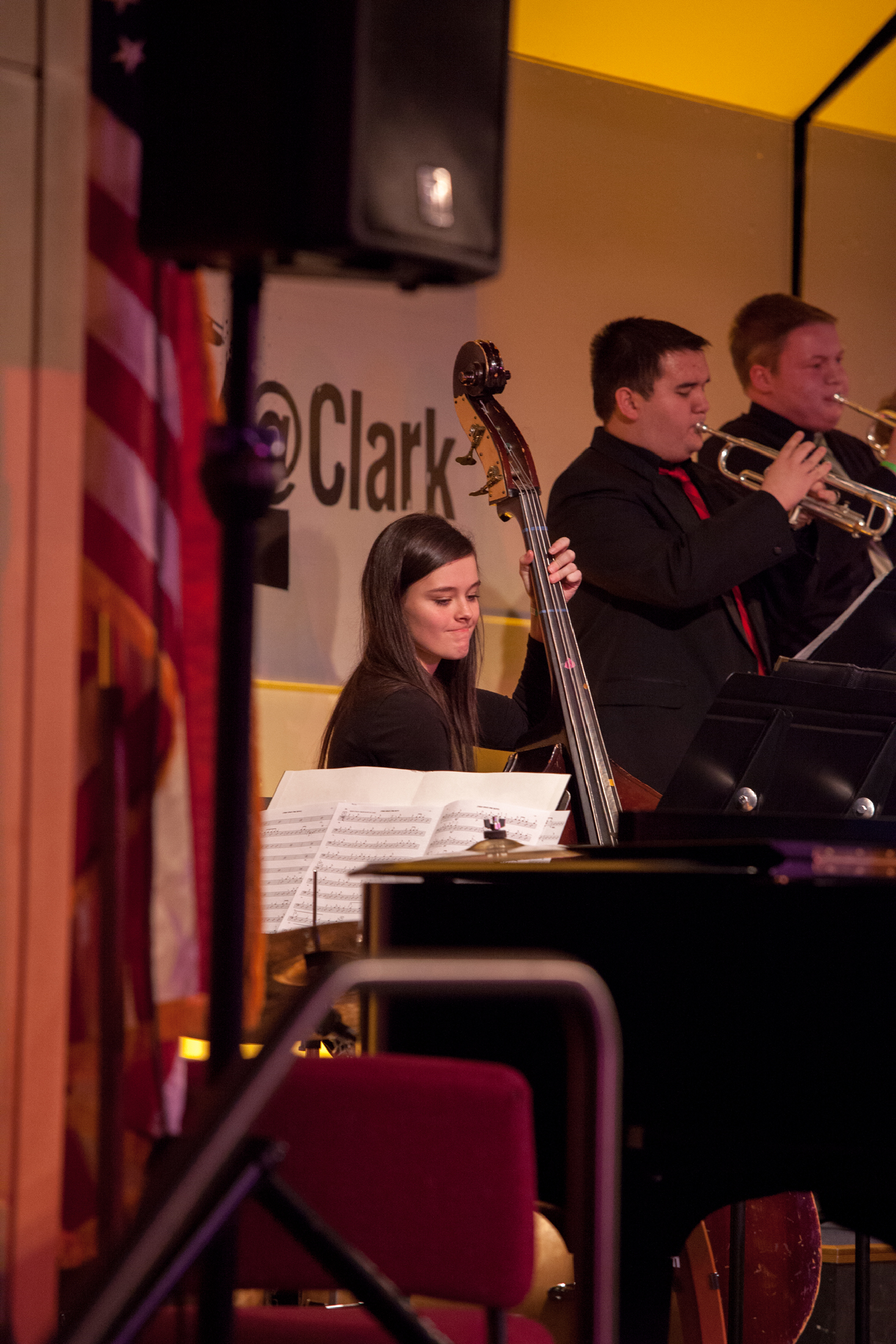
Jazz Festival at Clark College
Clark College hosts the 52nd annual Jazz Festival. Schools from the region come to compete and participate in music clinics at Clark Colleee.
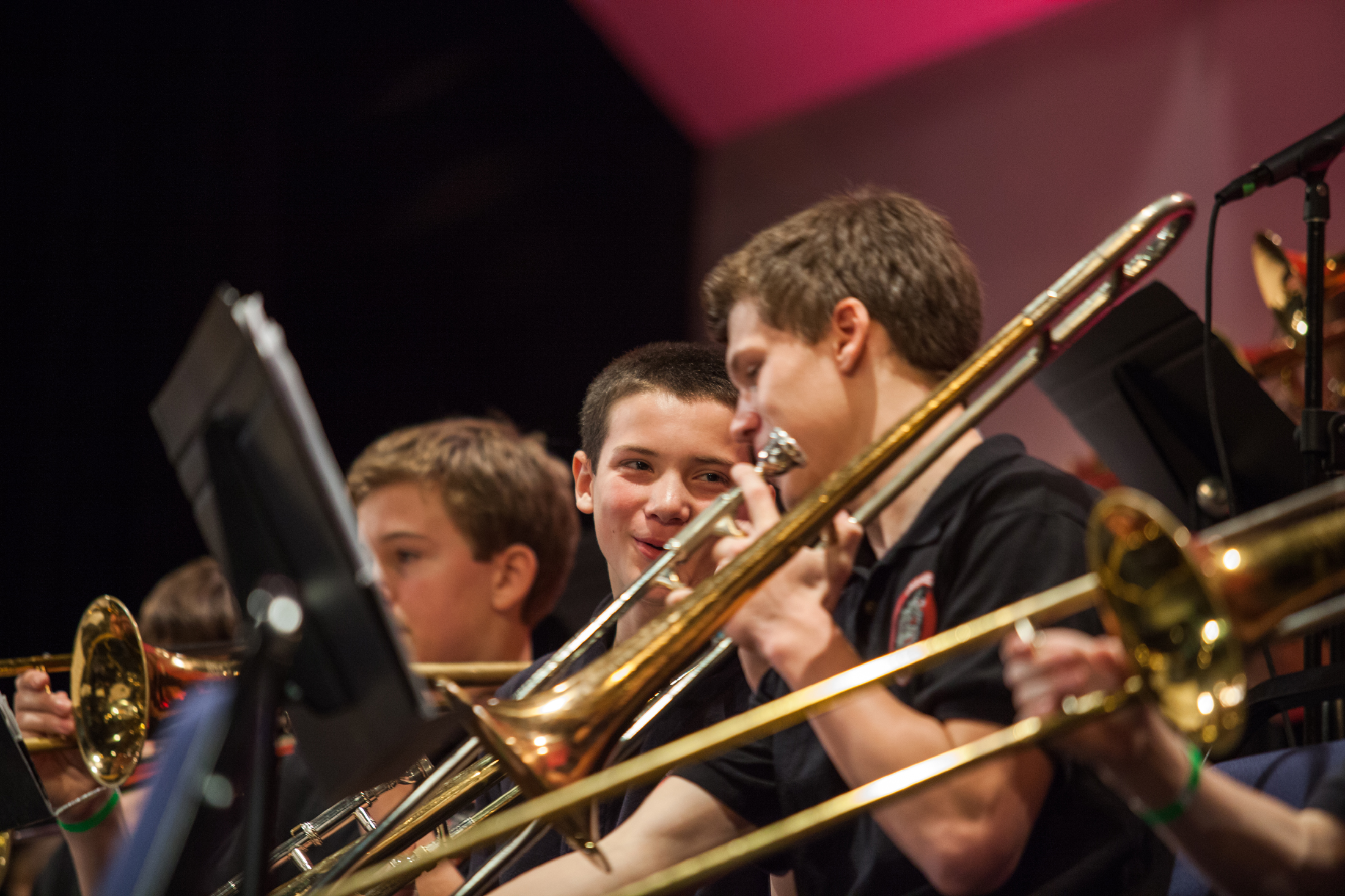
Jazz Festival at Clark College (middle school competition)
Clark College hosts the 52nd annual Jazz Festival. Schools from the region come to compete and participate in music clinics at Clark Colleee.
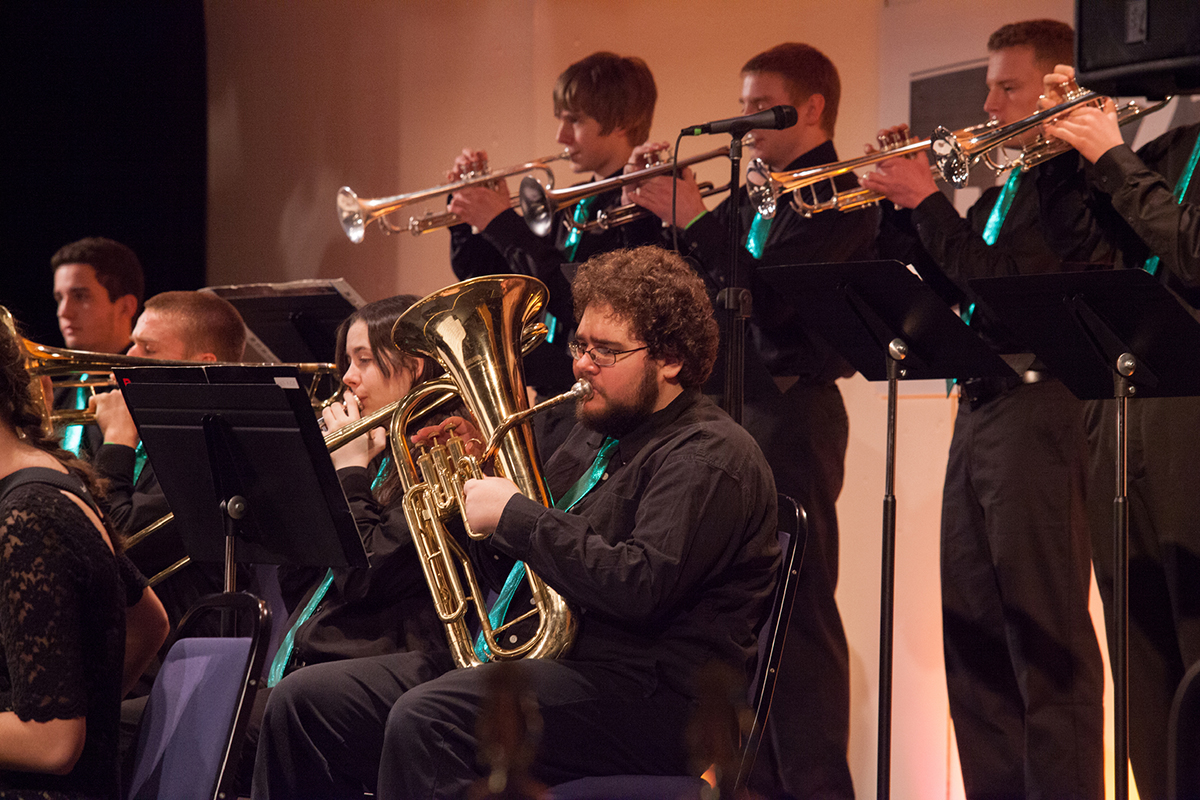
Jazz Festival at Clark College
Clark College hosts the 52nd annual Jazz Festival. Schools from the region come to compete and participate in music clinics at Clark Colleee.
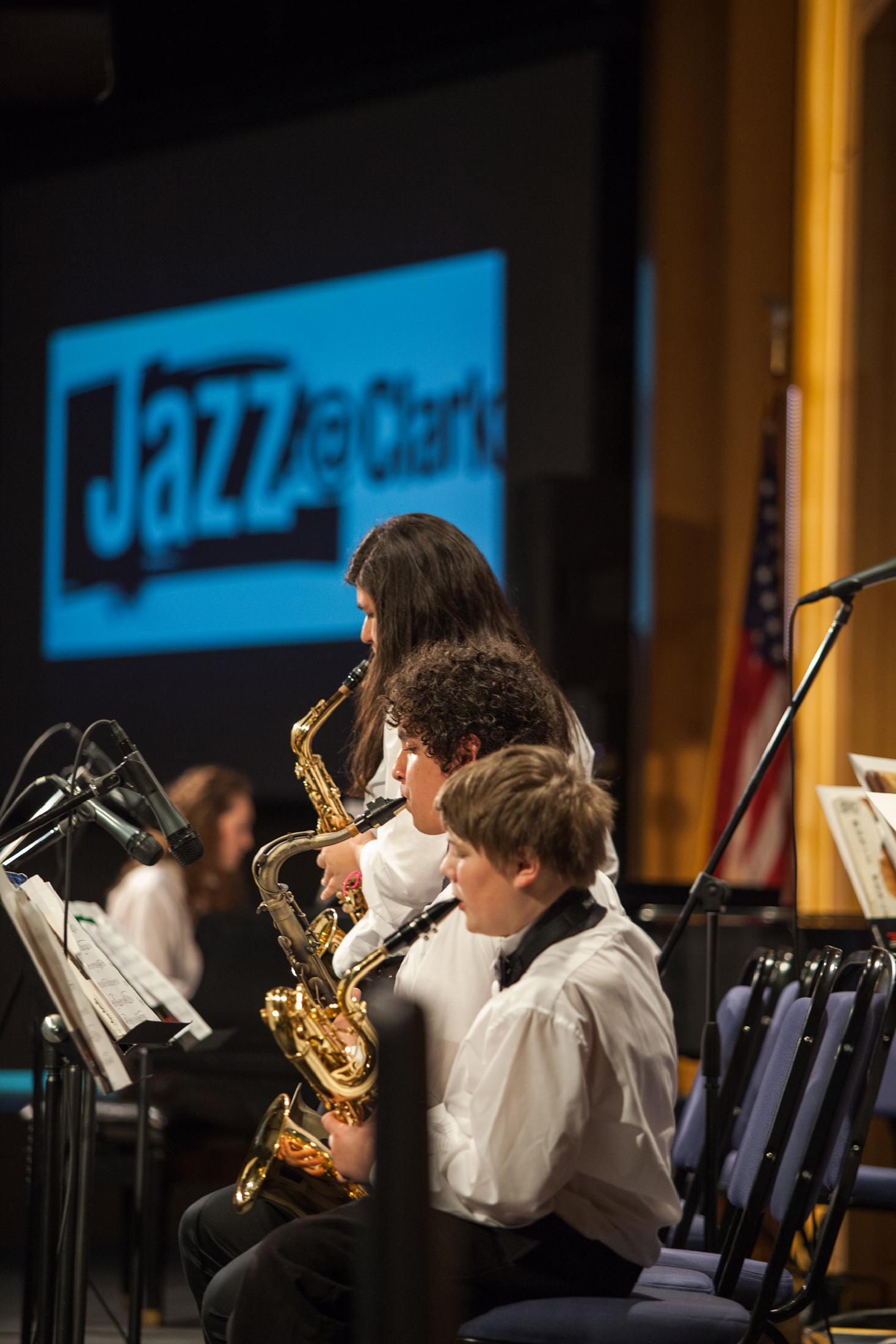
Jazz Festival at Clark College (middle school competition)
Clark College hosts the 52nd annual Jazz Festival. Schools from the region come to compete and participate in music clinics at Clark Colleee.
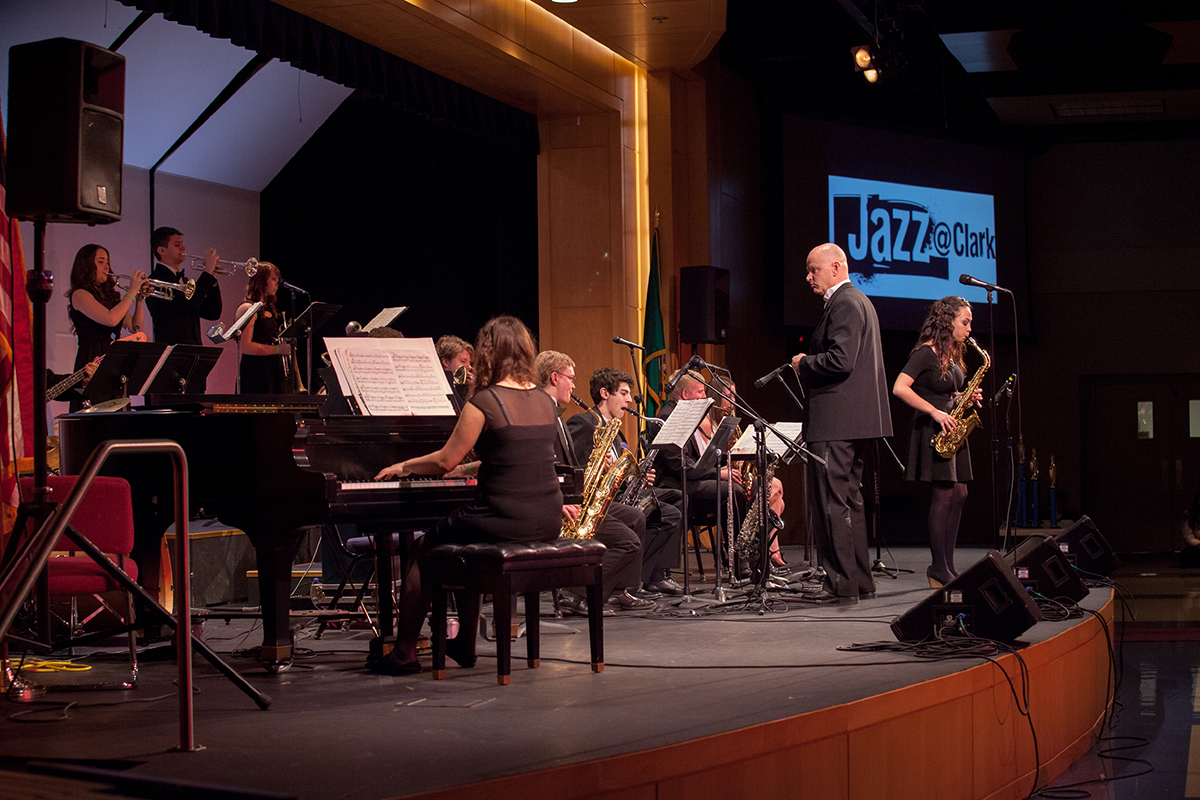
Jazz Festival at Clark College
Clark College hosts the 52nd annual Jazz Festival. Schools from the region come to compete and participate in music clinics at Clark Colleee.
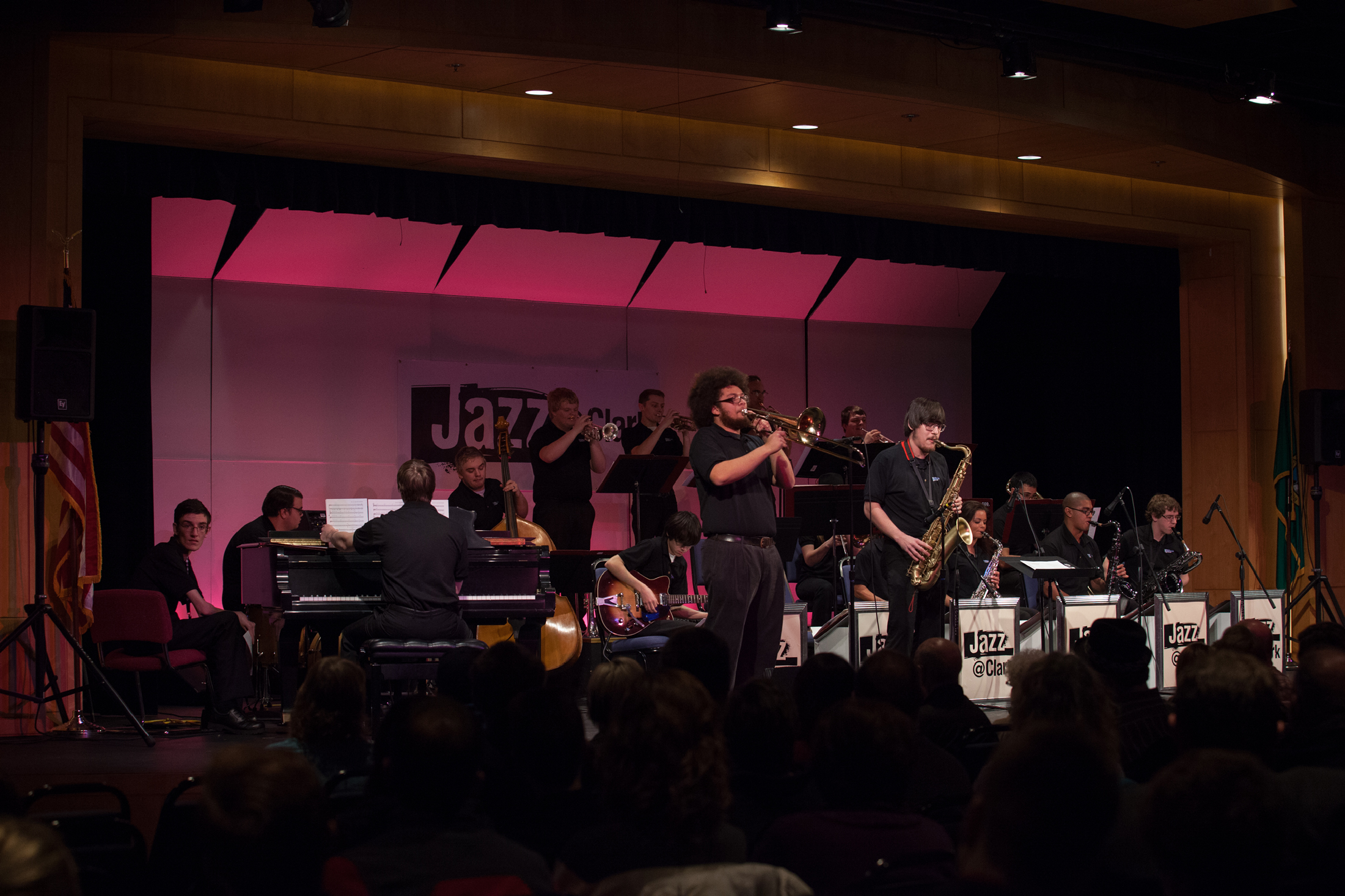
Jazz Festival at Clark College
Clark College hosts the 52nd annual Jazz Festival. Schools from the region come to compete and participate in music clinics at Clark Colleee.
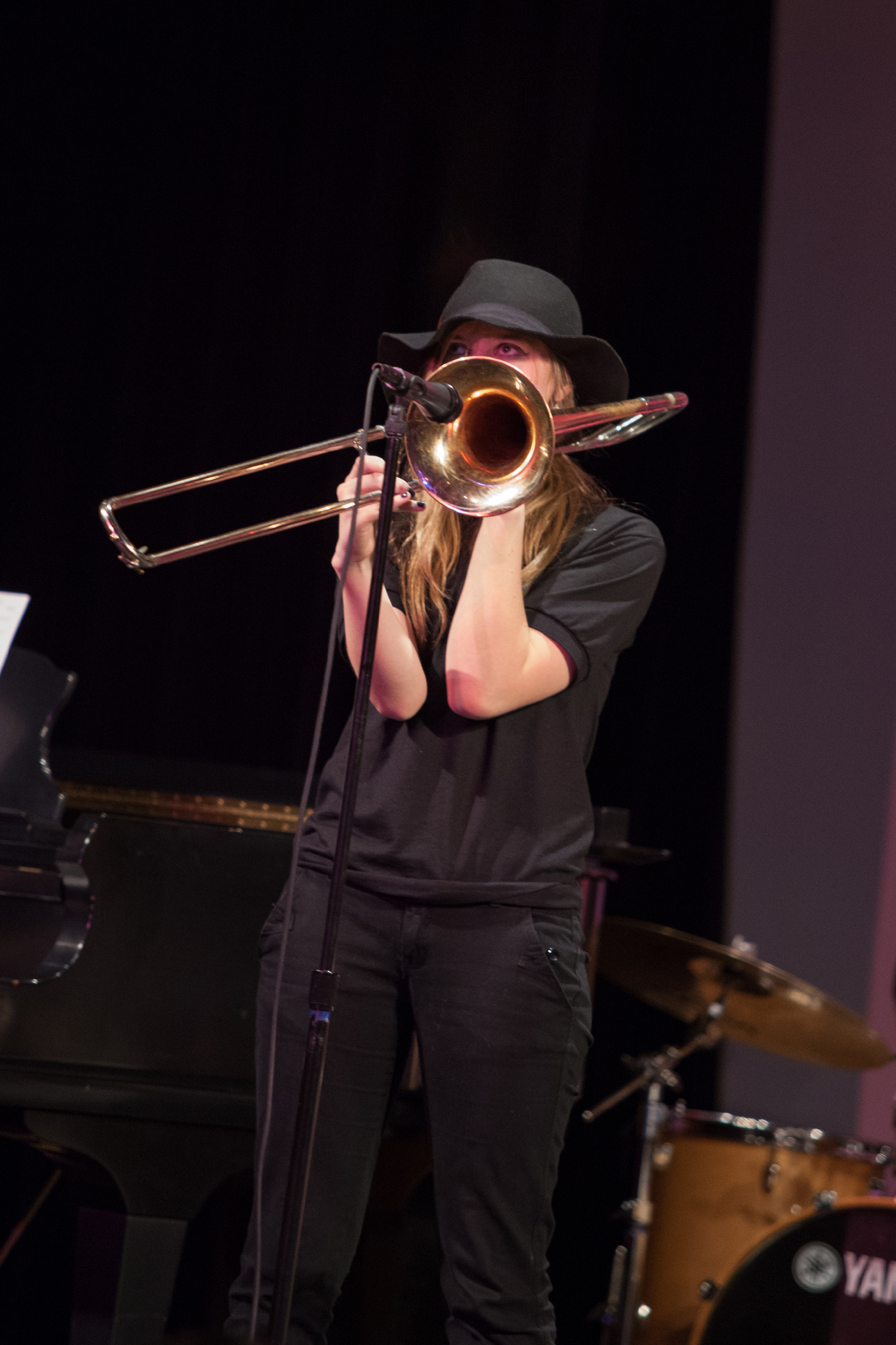
Jazz Festival at Clark College
Clark College hosts the 52nd annual Jazz Festival. Schools from the region come to compete and participate in music clinics at Clark Colleee.
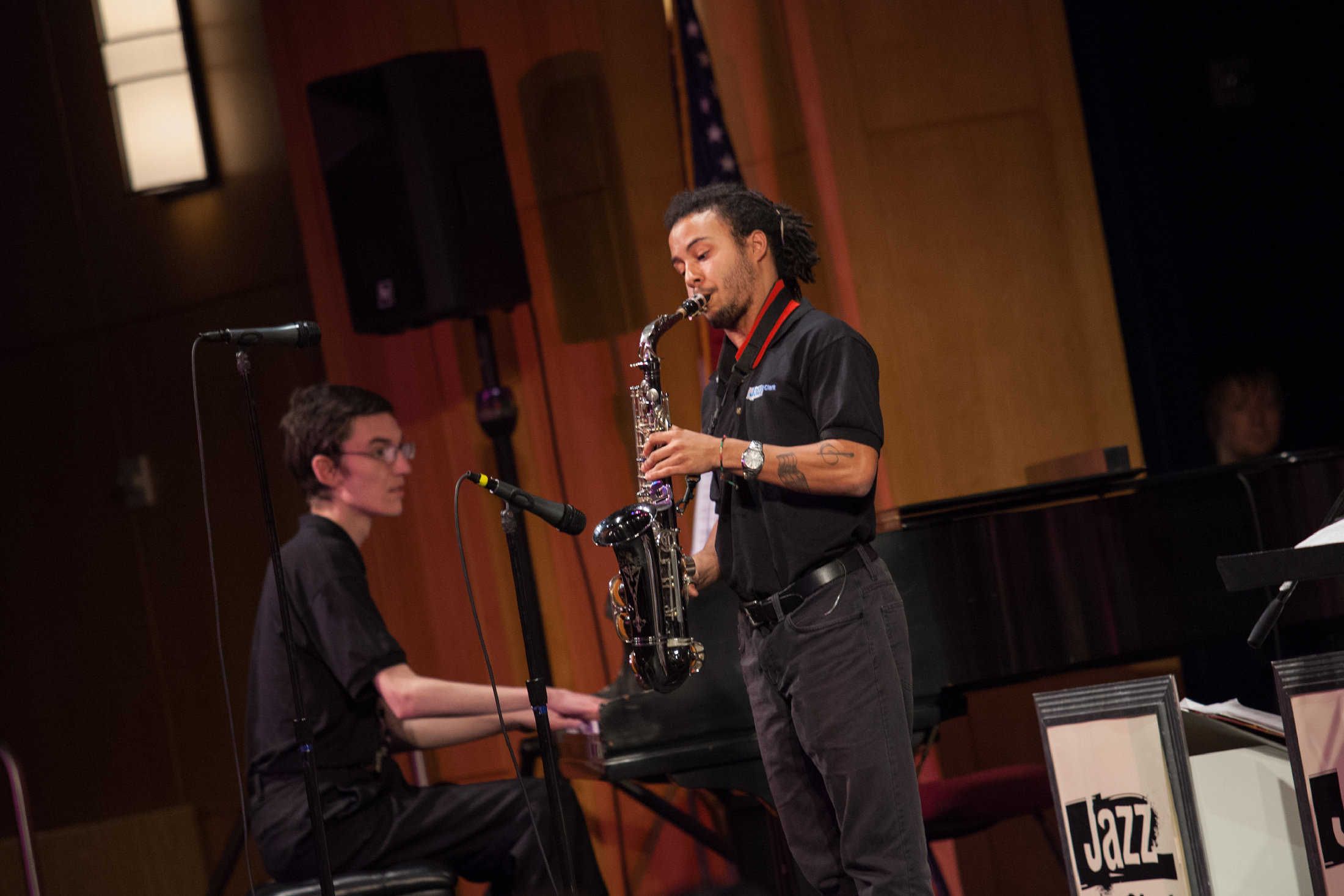
Jazz Festival at Clark College
Clark College hosts the 52nd annual Jazz Festival. Schools from the region come to compete and participate in music clinics at Clark Colleee.
Friday, January 31, 2014 A and AA division high school jazz ensemble finals results:
A Division:
1st place – Ridgefield High School Jazz I, Ridgefield, Washington
2nd place – Woodland High School, Woodland, Washington
3rd place – Astoria High School, Astoria, Oregon
AA Division:
1st place – Hockinson High School, Brush Prairie, Washington
2nd place – Fife High School from Tacoma, Washington
3rd place – Washougal High School from Washougal, Washington
Outstanding high school musician awards for the A Division were presented to:
John Mcgee from Philomath High School, Philomath, Oregon
Devin Van Laar from Trout Lake High School, Trout Lake, Washington
Nick Bischoff from Ridgefield High School II, Ridgefield, Washington
Nathan Mitchell and Gabrielle Allegri from Ridgefield High School I, Ridgefield, Washington
Outstanding AA high school musician awards for the AA Division were presented to:
T Anderson from Washougal High School, Washougal, Washington
Erin Jones from Fife High School, Tacoma, Washington
Nathan Nyseth and Lillian Quintana from Hockinson High School, Brush Prairie, Washington
Jack Tietjen from R.A. Long High School, Longview, Washington
Daniel Kransuler and Jenny Kim from Sammamish High School, Bellevue, Washington
Saturday February 1, 2014 AAA and AAAA division high school jazz ensemble finals results:
AAA Division:
1st place – Meadowdale High School from Lynnwood, Washington
2nd place – Mt. Spokane High School from Spokane, Washington
3rd place – Mead High School Jazz I, Spokane, Washington
AAAA Division:
1st place – Garfield High School from Seattle, Washington
2nd place – Battleground High School from Battleground, Washington
3rd place – Union High School from Camas, Washington
Outstanding high school musician awards for the AAA Division were presented to:
Cormac Liotta Sharma from Roosevelt High School II, Seattle, Washington
Ori Levari from Meadowdale High School, Lynnwood, Washington
Andrew Sauage and Travis Widmer from Mt. Spokane High School, Spokane, Washington
Lanie Pham form Battle Ground High School, Battle Ground, Washington
Jorge Marcia from Vancouver School for the Arts and Academics, Vancouver, Washington
Outstanding high school musician awards for the AAAA Division were presented to:
Kaleb Armstrong, Steve Mantecucco, and Nickolas Schell from Battle Ground High School, Battle Ground, Washington
Devin Perez from West Salem High School, Salem, Oregon
Isak Washuburn-Gaines, Alice Mar-Abe, and Jack Swigget from Garfield High School, Seattle, Washington
Stephen Reid from Union High School Jazz I, Camas, Washington
Jimmy Root from Lake Stevens High School, Lake Stevens, Washington
Shelly Williams contributed to this article.
Photos: Clark College/Jenny Shadley
See more photos on Flickr.
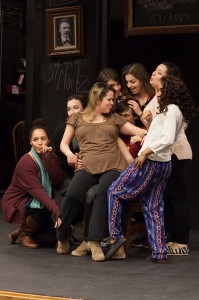 A stinging indictment of 19th-century repression, Wedekind’s original play was banned after its release. Even today and translated into musical form, Spring Awakening’s themes of sexuality, abuse, rape, incest, suicide, and abortion are still highly controversial and emotionally charged. “Clark College Theatre is taking a conscious path toward developing the student as a performing artist,” says Rusty Tennant, who is also the Artistic Director of Fuse Theatre Ensemble. “Our goal is to provide ample opportunity for students to participate in work that is relevant to the current trends and movements in the world of theatre. Spring Awakening is a critically acclaimed show based on a revolutionary play, with young adults composing the majority of the cast. In so many ways, this is the perfect play for us to present.”
A stinging indictment of 19th-century repression, Wedekind’s original play was banned after its release. Even today and translated into musical form, Spring Awakening’s themes of sexuality, abuse, rape, incest, suicide, and abortion are still highly controversial and emotionally charged. “Clark College Theatre is taking a conscious path toward developing the student as a performing artist,” says Rusty Tennant, who is also the Artistic Director of Fuse Theatre Ensemble. “Our goal is to provide ample opportunity for students to participate in work that is relevant to the current trends and movements in the world of theatre. Spring Awakening is a critically acclaimed show based on a revolutionary play, with young adults composing the majority of the cast. In so many ways, this is the perfect play for us to present.”